|
St. James' Street
   
Castle Hill before 1903
  
Dover
01304 213066
https://www.thewhitehorsedover.co.uk/
https://www.facebook.com
https://whatpub.com/white-horse
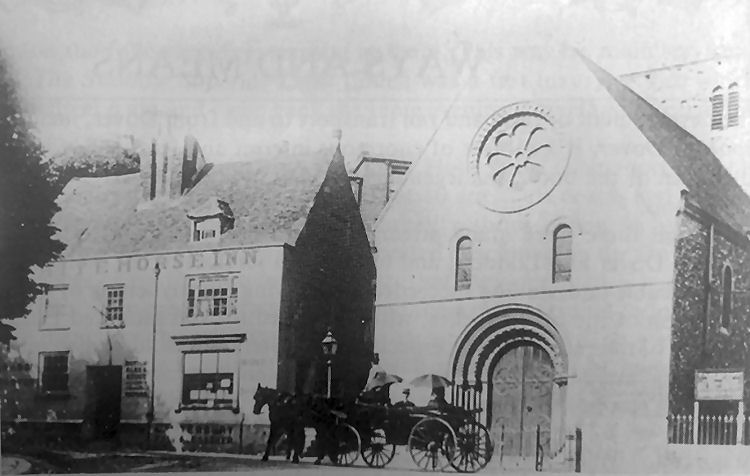
Above photo, 1886, kindly sent by Rory Kehoe. |
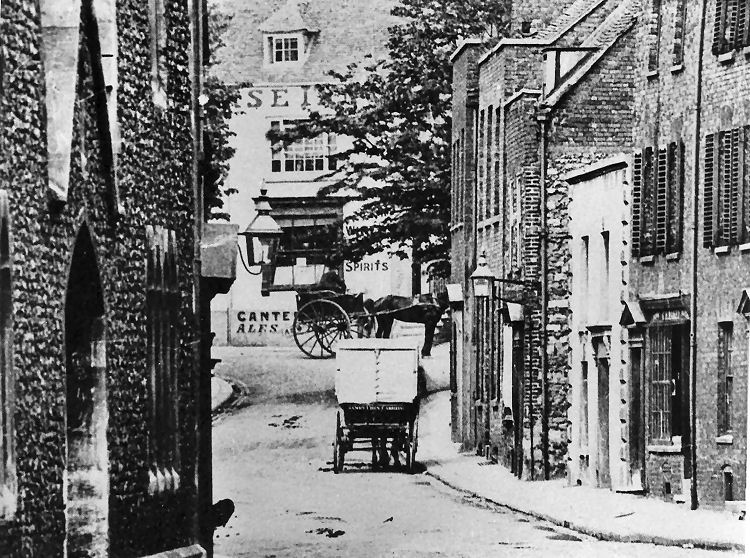
Above photo, from Paul Wells, 1890. |
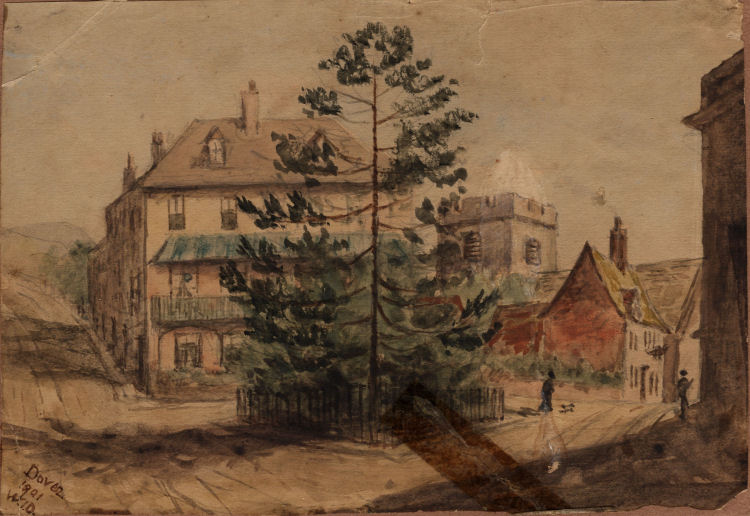
Hubert Terrace off Woolcomber Street, 1901, showing The White Horse on the right. By kind permission of Dover Library. ILL/457.
|
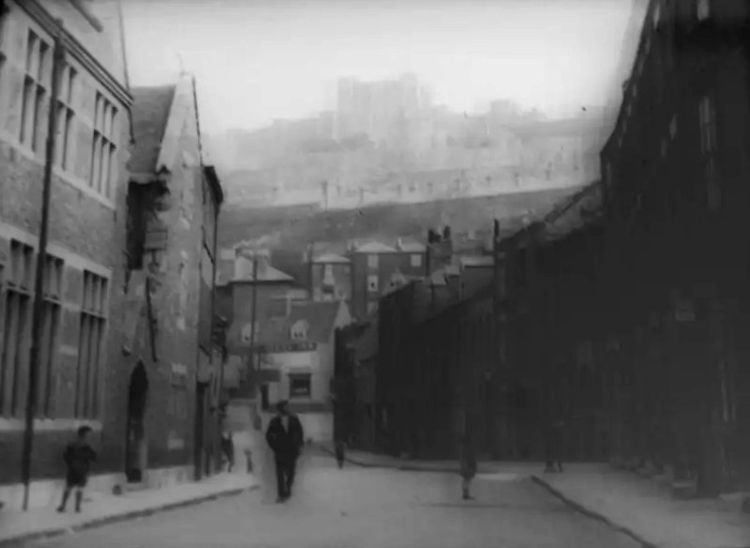
Above photo, circa 1911, kindly sent by Rory Kehoe. Shown as a tied
house within the estate of George Beer's Star Brewery, Canterbury. |
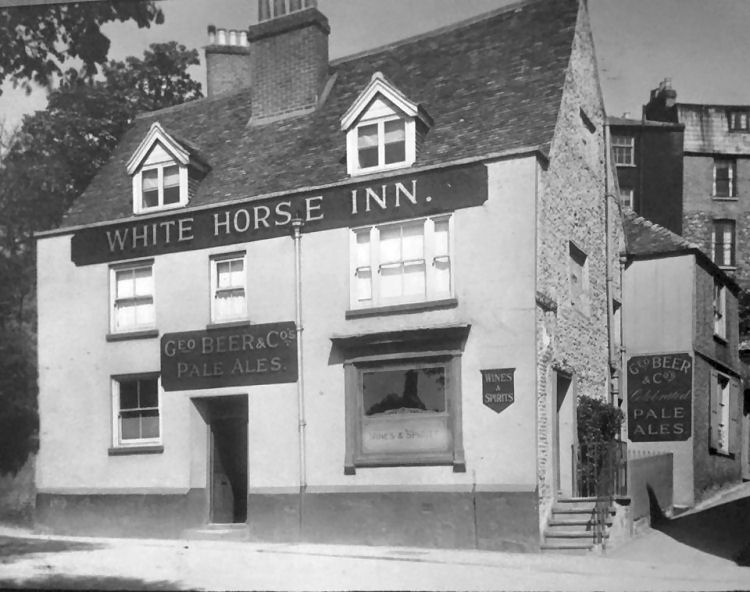
Above photo from the John Gilham collection, circa 1920. |
|
From the Dover Express and East Kent News, Friday, 27
September, 1907. Price 1d.
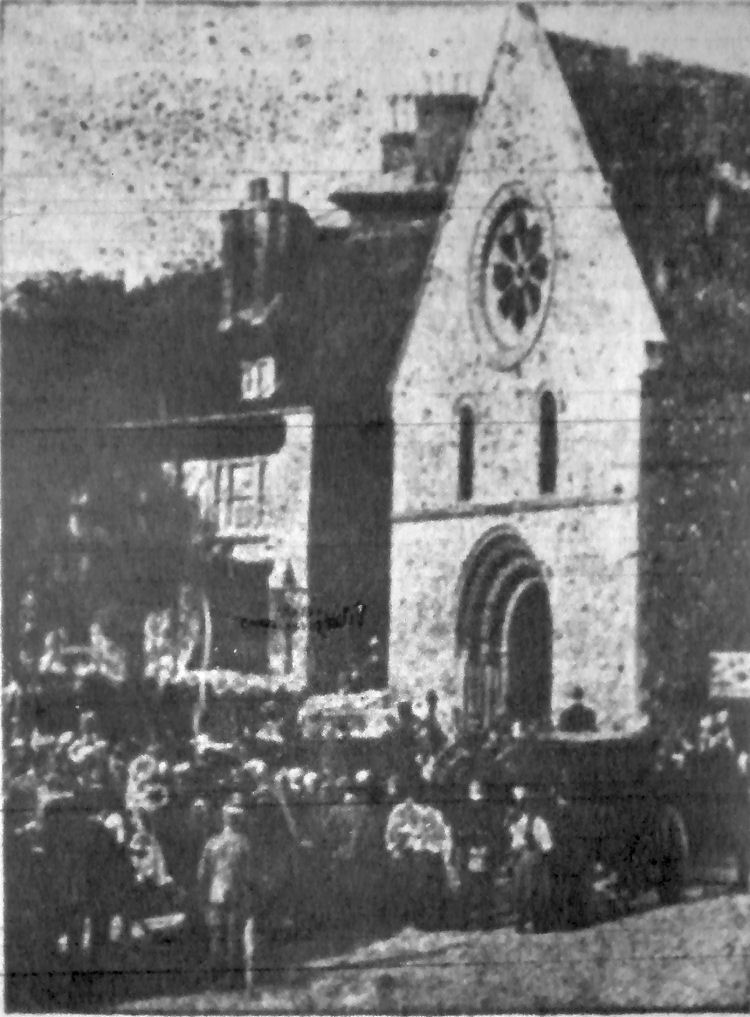
Above picture showing scenes at the funeral of Sir
Wollaston Knocker after the service at St. James's Church. The "White
Horse" is the building on the left.
|
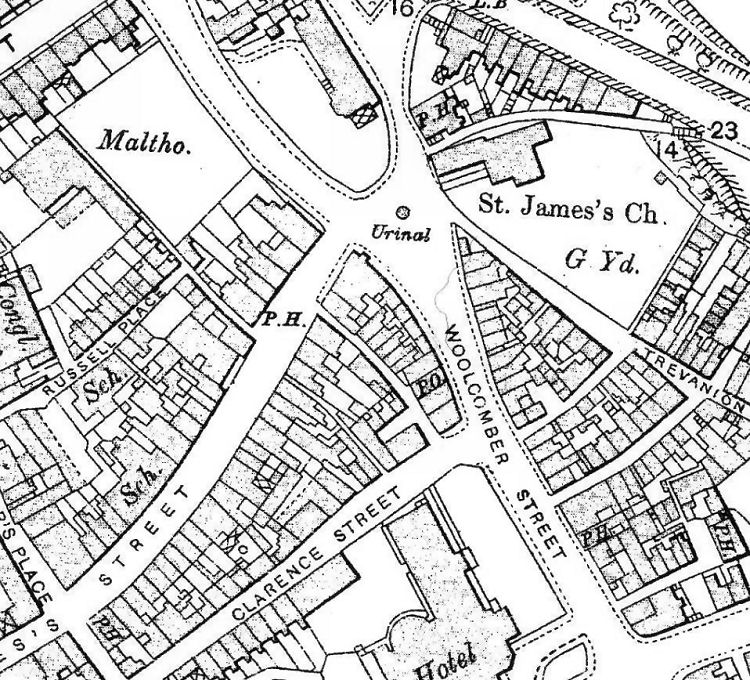
Above map 1937. |
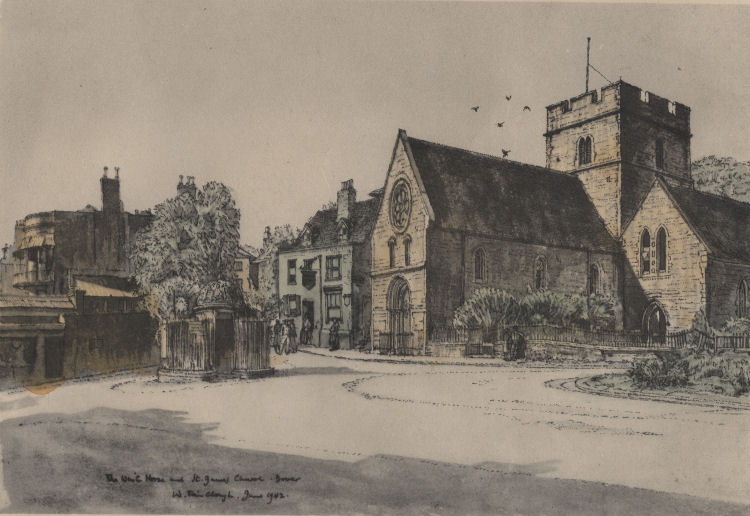
White Horse and St. James Church by W. Fairclough, June 1942.
|
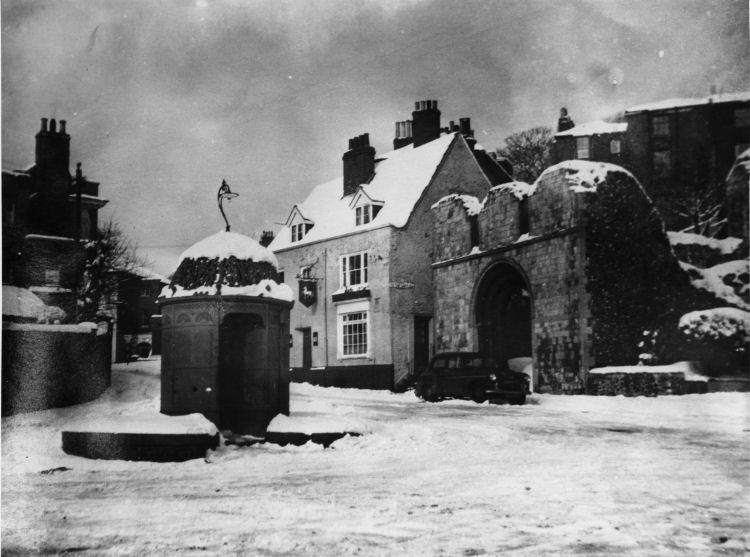
White Horse and St. James Church circa 1950. I wouldn't be at all
surprised if the watercolour below wasn't taken from the picture above.
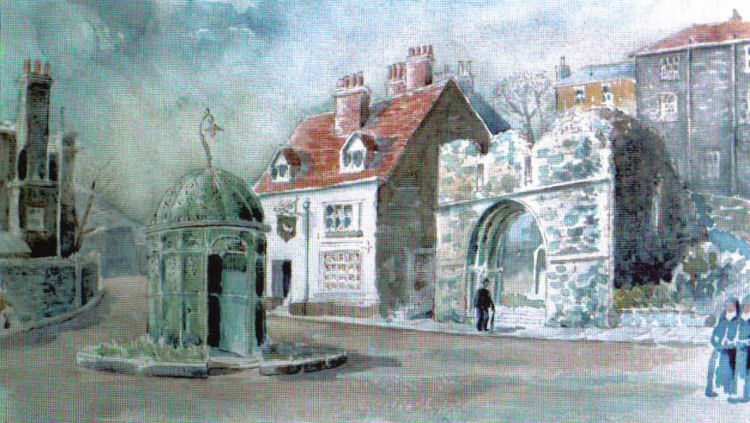
|
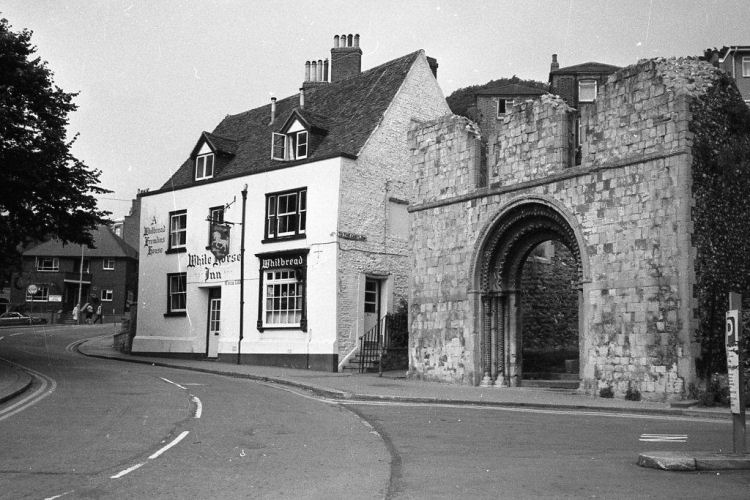
Above photo kindly sent and taken by John Fagg in the 1980s. |
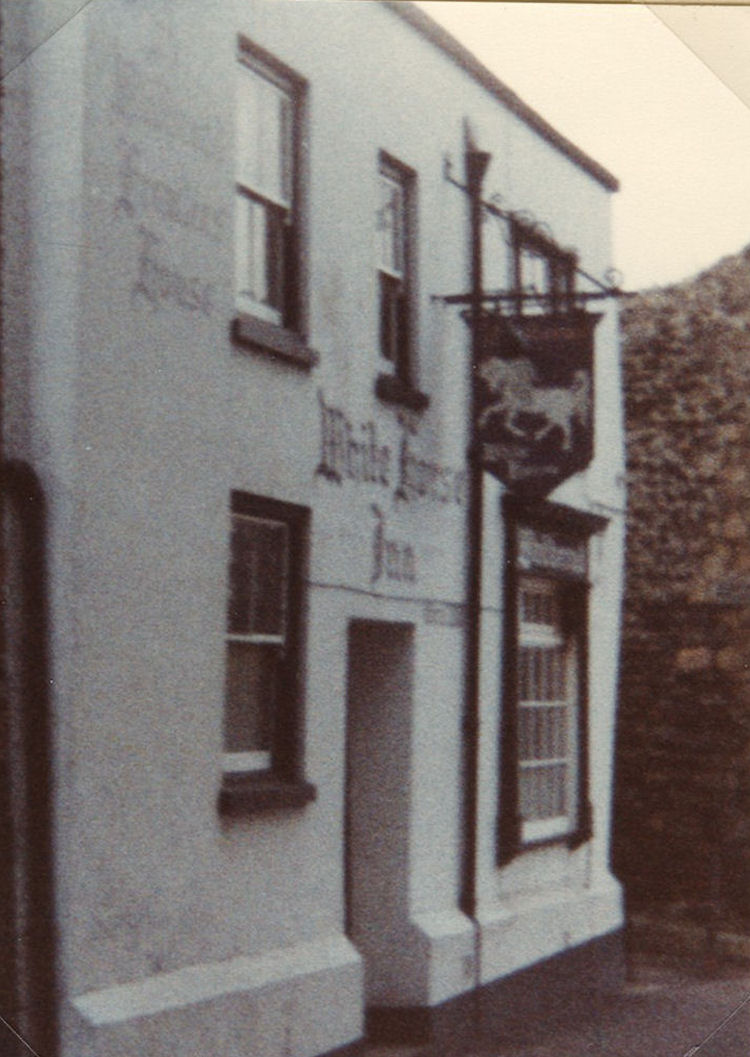 |
|
Above White Horse circa 1980 by Barry Smith. |
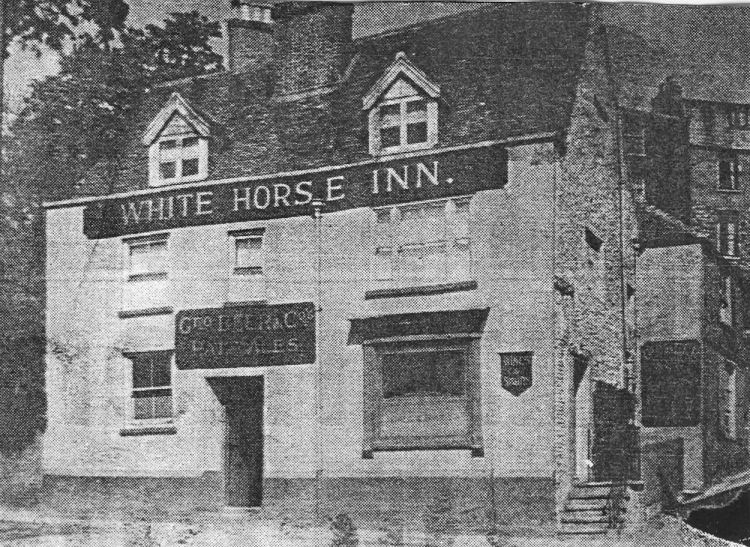 |
|
Above date unknown. Below circa 1990. |
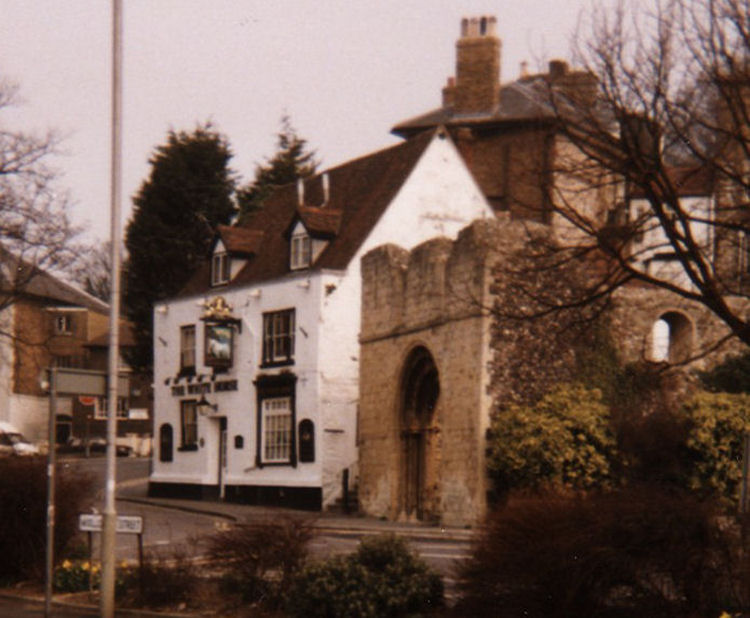
Above photo, date unknown. |
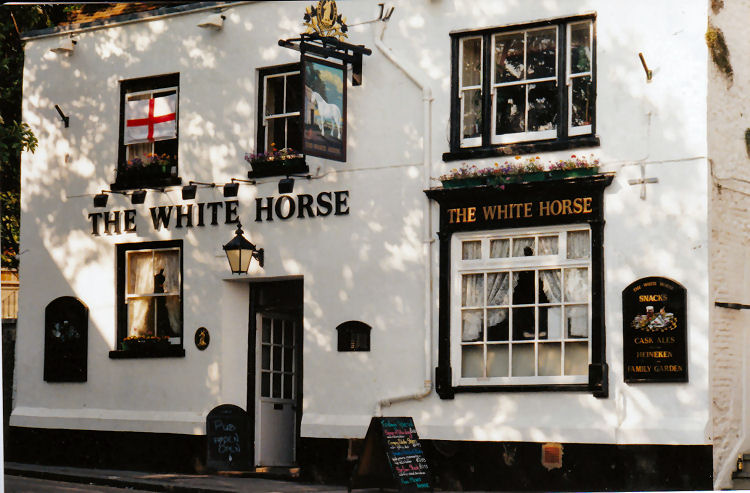
Above photo, 1996, kindly sent by Michael Lock. |
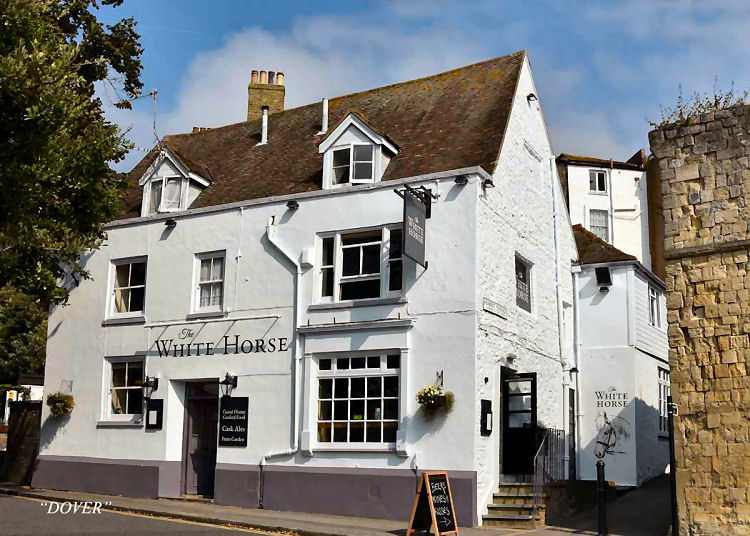
Above photo kindly sent by White Horse, 2016. |
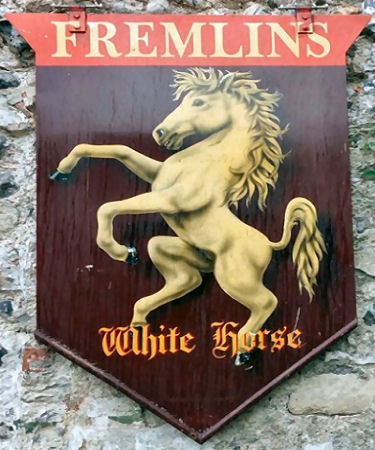
Above sign 1978, kindly sent by Rory Kehoe. |
On the corner with Hubert Passage, this had been known earlier as "The
City of Edinburgh", the title changing previous to 1792.
Barry Smith found reference to this pub address as in the Buckland
area, the dates given for the licensee named John Edward Butler are from
between 1847 and 1852. Further research tells me this is actually this pub
in St. James's and not another with the same name in Buckland.
|
Kentish Gazette, 31 March 1820.
On Tuesday a Coroners Inquest was held at the "White Horse Inn,"
Dover, on the body of George Somers of Dumpton,
in the parish of St. Peter, Thanet, late a prisoner in Dover Castle,
when a verdict was returned—
Died by the visitation of God.
|
|
Kentish Gazette, 5 January, 1821.
Dec 28, at Dover, Mrs. Bullard, of the "White Horse Inn," to the
great regret of an affectionate husband and seven children, by whom
her loss will be long and severely felt.
|
|
Kentish Gazette, 25 September, 1821.
MARRIED.
Sept. 20, at St. James’s church, Dover, Mr. Thomas Bullard, landlord
Of the "White Horse" public-house, to Miss Eliz. Field.
|
|
From the Kentish Weekly Post or Canterbury Journal, 23 August, 1822.
Thomas Bullard, landlord of the "White Horse, St James's street, Dover,
was on Friday last taken into custody, charged with shooting at his wife
with a loaded pistol; he was committed but has since been liberated, on
bail being tendered for his appearance. It is said the offence was
committed in a fit of jealousy. When searched another loaded pistol and a
knife was found on his person. Bullard has a large family by former
wives; his present wife is a young woman to whom he had been married but
a few months, and who had been confined only a few days previous to the
commission of the offence.
|
|
From the Kent Herald, 25 March 1824.
Death.
March 18, Mr. T. Bullard, landlord of the "White Horse" public-house, Dover,
aged 61 years.
|
|
From the Kent Herald, 29 July 1824.
On Sunday night some thieves broke into the "White Horse" public house in Dover,
and stole therefrom a quantity of half-pence, glasses, liquor, and other
articles; their attempts to get at the beer were frustrated by the cocks having
been screwed off. After breaking open four doors and taking what was found
convenient for their purpose, they decamped undisturbed.
|
|
From the Kentish Gazette, 5 April, 1836.
DOVER CONSTITUTIONAL ASSOCIATION
The annual supper of the first branch of this society took place on
Wednesday evening, at the "White Horse Inn," in St. James's Street. The
cheer, old English substantials, did infinite credit to the provider,
and the evening was spent by the company with much hilarity, regulated
by due decorum. After the healths of the King, the Queen, and Royal
Family, the Duke of Wellington, &c, the members for Dover, and long may
they continue our representatives, were duly honoured. Mrs. Fector and
family were also drunk with unbounded applause, as were the healths of
the Mayor and several gentleman of Dover. At a seasonable hour the party
separated, much pleased with their entertainment, and expressing warm
obligations to the chairman, Mr. W. Griggs, under whose judicious
arrangements everything had proved so much to their satisfaction.
Dover Telegraph.
|
|
From the Dover Telegraph and Cinque Ports General
Advertiser, Saturday 7 February, 1846. Price 5d.
CORONERS INQUEST
An inquest was held on Tuesday (at which Mr. Kennett officiated in
the absence of the Coroner,) at the "White Horse," top of St.
James's-street, on the body of a child found in Eastbrook, and relative
to which the following evidence was adduced:-
Mary and Ann Goodwright- At about four o'clock this afternoon, while
passing, in company with Mrs. Barton, Jennings's garden at Eastbrook, we
stopped to gather some bay leaves, and whilst doing so saw a bundle
lying by the palings on the inside of the garden, which we supposed
contained broken victuals. Mrs. Barten wished to let it remain, but I
said "Let us inspect it," which we did, and on opening the bundle
perceived a child's foot. We then called a policeman, (Gardner,) who
took the body to the "White Horse."
The evidence of the last witness having been fully corroborated by
Caroline Barton, the inquest was then adjourned till seven o'clock on
the following evening, in order that time might be allowed for a
post-mortem examination of the body.
On Wednesday the adjourned inquest took place, and prior to the
examination of witnesses being resumed, the coroner (Mr. Kennett,)
remarked that from several observations made to him during the day
relative to Mrs. Goodwright, and the fact of her husband also having
been in the vicinity of Eastbrook on the day of finding the body, he had
been induced, in the presence of the foreman and some others of the
jury, to a private interrogation of the woman, but nothing elicited
afforded any ground for the least suspicion, or cast the slightest
imputation on the parties.- The investigation was then resumed, at which
the following additional particulars were detailed:-
George Edwin Williams, resident medical officer at the Dover
Dispensary- I have made a post-mortem examination of the body, but have
found no external injuries. I am certain that the child was born alive.
It appeared about twelve hours old. I consider the immediate cause of
death to have been the neglecting to fasten the umbilical cord in a
proper manner.
Caroline Barton again confirmed the evidence given by the witness
Goodwright, on Tuesday, and stated that at the time of finding the body
they observed no one loitering near the spot. Mrs. Goodwright was
disposed at first to say nothing about the finding of the bundle, but on
my saying that those who would consider a murder were equally guilty
with those committing it, we decided on making the matter known, and did
so without delay.
John Goodwright, mariner- On Tuesday morning, ay 10 o'clock, I went
to my brother-in-law's, who resides in Woolcomber-street, where I had a
glass of beer. I then left and went to Charlton by the lane leading to
Mr. Jenning's house. When I got as far as Mr. Elgar's meadow it began to
rain, on which I returned home, accompanied by a man named Datlen, with
whom I am acquainted. I saw no one else there at the time.
No further evidence having been adduced, the coroner summed up, and
the jury retired, and after nearly an hour's consultation returned the
following verdict:-
"That the infant died from the neglect of its mother, but by whom it
was placed in the garden there has been no evidence to show."
|
|
Dover Chronicles 10 April 1847.
An inquest was held before G. T. Thompson Esq, for the Borough on
Monday afternoon last, at the "White Horse," St. James's Street, on
view of a body of Sarah Newman, widow, Trevanion Street, age 81, who
died from injuries she sustained by her clothes catching fire on the
previous Saturday night.
William Martin, waiter, Woolcomber Lane, deposed:- On Saturday
night, about 11:30, as I was in my house, I heard my neighbour, Mrs.
Mackett, crying "Fire!" in the street. I ran out, when she told me
Mrs. Newman was on fire. I went to the gate of Mrs. Newman's yard,
but it was fast. I broke the gate down, and upon entering the yard
found the poor woman there on her hands and knees. She had a portion
of her clothes around the upper part of her body, which was then in
a blaze; the lower part of a dress had been entirely consumed. Not
finding any mats handy, with which to extinguish the fire, I took a
tub of water which stood near me, and threw the water over her, and
it extinguished the flames. Her burns were chiefly confined to the
lower part of her body. The persons living in the same court had by
this time entered the yard, and appeared to have been called up from
bed; and I left deceased with them, and went into her home. I saw an
elbow chair on fire, standing by the left-hand side of the door, and
under the window. I put that out. I also saw a lighted candle
standing on a table, on the opposite side of the room to where the
chair was. It was in a candlestick. There was no fire in the grate.
The chair was much burnt on the right arm, the cushion, and seat. I
then went to see after the woman again, who I found with the
neighbours, who had covered her over with a cloak. A medical man
arrived while I was there; but the deceased had expired before he
arrived.
Mrs. Mackett, Trevanion Lane, deposed:- On Saturday night last,
between twenty minutes past eleven and half-past, I heard a scream.
Thinking it was a quarrel, I looked out, when I saw in the yard
close by deceased's house a flare, as of linen burning, which lasted
but a moment, and then there was a quantity of sparks. I smelt a
peculiar stench, as of woollen burning, upon which I ran out and
gave the alarm.
Mrs. Jane Taylor:- I live next door to deceased's house and know her
very well. I was in the frequent habit of looking in upon her, to
see how she did. She was very old and weak, and lived entirely
alone. On Saturday night last, at half-past ten, I saw deceased at
home. She was sitting in her arm chair, (which was placed under the
window,) taking some tea. Her tea-things were on a chair, which was
placed by her right hand somewhat in front of her. The fire was out.
I then went home to bed, and about half-past eleven was aroused by
the cry of "Fire." I got up, and went into deceased's house. I saw
her elbow chair on fire. Her tea things had been put into her
cupboard, in there accustomed order, and her tea-board hung against
the wall as usual. She was dead before she was carried into her
house. On Saturday night she wore a cotton gown. She was very
eccentric; and I believe her to have been in the habit of sleeping
all night in her arm-chair. Did not see her reading on Saturday
night. Think she could not read.
Henry Horn, superannuated coast-guardsmen, and brother to deceased,
deposed. Deceased was very eccentric, and preferred living alone to
going into the Union; and though witness had repeatedly wished her
to remove to his home, where proper care wound be taken of her, she
would not be persuaded to do so. Think she did not go to bed for
nights, which might have been owing to the dangerousness of the
ladder by which he had to proceed to her bedroom.
After a brief consultation, the Jury returned a verdict:- "That the
deceased, Sarah Newman, died from injuries she received by her
clothes accidentally taking fire."
|
|
From the Dover Telegraph and Cinque Ports General Advertiser, Saturday, 10 April, 1847. Price 5d.
CORONER'S INQUEST
Another inquest was held before the same Coroner, on Monday, at the
“White Horse,” on the body of Sarah Newman, widow, aged 81. The Jury
having viewed the body, the following evidence was taken:-
Thomas Marks, waiter, Woolcomber Lane, deposed: On Saturday night about
half past 11, I heard Mrs. Mackett cry out fire. I went out to her, and
she told me Mrs. Newman's house was on fire. I went to the gate, but
found it fastened. I broke the gate down, and on entering the yard found
deceased on her hands and knees, with her clothes in a blaize; and not
finding any mats, I threw a pail of water over her, which extinguished
the flames. Some of the neighbours then came in, and wrapped a cloak
round her. On going into her house, I saw an elbow chair close to the
fire in flames, which I extinguished. There was a lighted candle
standing on a table, in the opposite part of the room. There was no fire
in the grate. The right arm and cushion of the chair were much burnt. A
surgeon, Mr. Jones, then arrived, but deceased had expired.
Sarah Mackett, residing in Trevanion lane, deposed: On Sunday about half
past 11, I heard a scream, and on looking out of the back window, I saw
a blaize in the yard, close to the house of deceased, and then a
quantity of sparks. There was a strong smell of burning woollen, and I
thought it was Mrs. Taylor's house on fire. I then ran out and gave an
alarm.
Jane Taylor, wife of Isaac Taylor, residing in Trevanion Street,
deposed: I have lived next door to deceased about 4 years. She was very
infirm, and I usually looked in the last thing in the evening. On
Saturday night I went in about half-past ten o'clock, and found her
sitting in the arm-chair, taking some tea. The tea things were by her
side in a chair, and a candle was burning on the same chair. The fire
was out. I did not speak to her as she was very deaf. I then went to
bed, and was awakened by persons calling out fire. I got up and found
deceased lying in the yard. On going into her room, I found the tea
things put into the cupboard, and the tray hung up in its usual place.
Deceased, who lived alone, was very eccentric in her habits, and usually
slept all night in her chair.
Henry Horne, brother of deceased, deposed: My sister was 81 years of
age. He husband died about 4 years since, and I then wished her to come
and live with me, but she would not do so, nor go to the Union.
Verdict – That deceased died from her clothes accidentally catching
fire.
|
|
From the Dover Telegraph and Cinque Ports General
Advertiser, Saturday 3 June, 1848. Price 5d.
PETTY SESSIONS
John Butler, licensed victualler, was summonsed by Mr. Jacobs, clerk
of the Dover Loan Society, for the sum of £2 14s. It appeared that
defendant had become security to the society for a loan to John Nash, of
which the above sum remained unpaid. - The Clerk said he considered the
society ought first to proceed against the borrower, and then, in the
event of not getting the amount due, to sue the surety; and the case was
adjourned for that purpose.
|
|
From the Kentish Gazette, 27 May, 1856.
CORONER'S INQUEST
On Friday evening an enquiry took place at the "White Horse Inn,"
before the borough coroner, Mr. Thompson, touching on the death of
Ulrich Muller - soldier of the British Swiss Legion, who was killed at
the Castle Barracks by the discharge of a firelock. The deceased for
some misconduct, had been reduced from a sergeant to the ranks, another
had also been reduced, and both had agreed to destroy themselves. As
they had no ball ammunition, pieces of tallow candle were submitted,
with large charges of powder; and by these means the deceased shot
himself. A verdict of "temporary insanity" was returned. The other one
having failed in his attempt to shoot himself, tried to throw himself
over the cliff, but was frustrated.
|
The early brewers connected with the premises were Iken, (or Jekin), and
Coleman and they later amalgamated with Edward Rutley.
|
From the Dover Express and East Kent Intelligencer, 19
September, 1863.
OF UNSOUND MIND
A middle-aged gentlemanly looking man, attired in a black frock-coat, and
having the appearance of a well-to-do man of business, was placed at the
bar. He gave the name of Thomas James, and said he belonged to Liverpool,
and he had been removed from the "White Horse Inn," St. James's Street,
early the same morning, at the request of the landlord.
Mr. John Friend, the landlord of the "White Horse," said the gentleman at
the bar was brought to his house about half-past eight o'clock on the
previous evening by a couple of artillerymen, respectable young men
apparently, who said they found him wandering about in Frith meadows,
evidently ignorant of his whereabouts. The gentleman seemed perfectly
rational when first brought into the house, and asked if he could have a bed
there. He was told that he could, and he then seated himself in the parlour,
where he was supplied with a couple of glasses of whiskey and water. After
that he had supper, and went to bed about eleven o'clock. He (Mr. Friend)
saw that the defendant was comfortably in bed, and then took away his
candle, but as he was leaving the room, the defendant told him he must get
to his office in Liverpool by nine o'clock next morning and made several
other strange remarks. Witness quietened him as well as he was able, but
after he had left him he watched his bedroom door for upwards of an hour.
The defendant remained perfectly quiet during this time, and nothing
occurred to disturb the house till about four o'clock in the morning, when
there was a great noise in the defendant's room. On getting to him he (Mr.
Friend) found him in a very excited state, declaring that his room had
undergone an alteration during the night, and that he could stay there no
longer. He also raised the window and shouted for the police, and as the
police answered his summons, he (Mr. Friend) thought they had better take
the gentleman under their care, although he (Mr. Friend) had no charge to
prefer against him.
Superintendent Coram said that among the property found upon the
defendant was a valuable gold watch and a through ticket to Paris via Dover.
He also understood that he had a carpet-bag and a portmanteau
(a case or bag to carry clothing in while travelling,
esp. a leather trunk or suitcase that opens into two halves) on
arriving at Dover, but what had become of them now it was impossible to say.
The defendant, in reply to the Magistrates, seemed to be unaware that he
had had any baggage, and made a very rambling statement. He adhered to his
first description of himself, however, that he belonged to Liverpool. This
account of himself, from other circumstances, appeared to be correct, and
the Magistrates therefore ordered that he should be detained till the
following day, and in the mean time a telegraph message dispatched to
Liverpool, in order that his friends might be communicated with.
From the Dover Express and East Kent Intelligencer, 3 October, 1863.
TUESDAY BEFORE THE MAYOR. REMANDED CHARGE
The gentleman of unsound mind remanded from the previous day, was now
handed over to the care of his son, who had arrived from Liverpool to take
charge of him.
|
|
From the Dover Express and East Kent Intelligencer, 19
March, 1864.
THE PIG NUISANCE
After the retirement of the Inspector of Nuisances, the Town Clerk
informed the Board that in the case of the alleged pig nuisance at the
rear of the "White Horse Inn," whereby some of the inhabitants of Hubert
Terrace had experienced annoyance, and in consequence of which
instructions had been given to prosecute the owner of the swine, Mr.
Friend, the hearing of the case had been adjourned till Friday
(yesterday), and he mentioned the circumstances in order to obtain the
opinion of the Board as to the desirability of applying for a case, in
the event of the Magisterial decision being taken against the Board, so
that the legal merits of the prosecution might be decided by a superior
court. It was evident that at present the Board and the Justices
differed in their interpretation of the act under which these
prosecutions were conducted. The Board held, and he thought properly so,
that pigs kept so as to be a nuisance to any neighbour, came within the
act of Parliament; but the Magistrates seemed to be of a different
opinion, and he thought it would be convenient, as well of as some
importance to the public, to have the legal point thus raised by the
authorities of a higher Court. The course he proposed to take, supposing
the decision adverse to the Board, was to apply for a special case, and
then take the opinion of council before proceeding.
Mr. Fox reminded the Town Clerk that if he made application for a
special case, he would have to give recognizance for carrying it to an
issue.
The Town Clerk had the impression that this course was not
compulsory, but Mr. Fox maintained that it was.
Mr. Rees asked if the difficulty would not be met by allowing this
case to take its course, and in the event of the decision being adverse,
council's opinion be taken and another summons taken out for the purpose
of raising the legal question. He was sanguine
(confident) however, that the decision would be this time
against the nuisance, seeing that there would not be the anomaly of the
informer (the Inspector of Nuisances) coming forward to declare that he
could not conscientiously declare his information to be true. (A laugh.)
The Town Clerk: No, we have guarded against that ; but I understand
the Inspector of Nuisances has been subpoenaed by the other side.
(Renewed laughter.)
In reply to observations made by other members of the Board, the Town
Clerk said his own opinion was that a case should be asked for,
supposing the decision to be again adverse to the Board.
Mr. Rees said that, as this was the conviction of the Town Clerk, and
as the case was one of much public importance, - for he believed some of
the most vital interests of Dover were involved in the question whether
one man could keep pigs under the parlour window of his neighbours with
impunity - he would move that instructions be given to the Town Clerk to
make the application suggested, in the event of such a course being
necessary.
Alderman Robinson seconded the motion, but on a division it was
negatived by 5 to 4.
Three of the Justices, it turned out, voted with the majority, and
Alderman Robinson commented in no very complimentary terms on what he
conceived to be the ill-state of a course so much at variance with the
traditional dignity of the magisterial mind.
THE OBJECTIONABLE SWINE
John Friend, landlord of the "White Horse Inn," was summoned for
unlawfully keeping swine on his premises to the annoyance of his
neighbourhood. Mr. W. Knocker appeared in support of the information,
and Mr. Minter for defendant.
Mr. Minter made application that the case might be remanded. The
summons was not served till Saturday, and Mr. Friend was then out of
town. He did not arrive home until about four o'clock in the afternoon,
when it was too late for him to gather any evidence for the defence. He
(Mr. Minter) hoped the Magistrates would grant a remand, as he intended
to subpoena the entire neighbourhood.
Mr. Knocker objected to a remand being granted, urging that defendant
had had time to obtain his learned friend's assistance, and he had
therefore had ample time to collect his witnesses.
The Magistrates, however, adjourned the case till Friday (yesterday).
THE ALLEGED PIG NUISANCE
John Friend, the landlord of the "White Horse Inn," was summoned for
keeping pigs at the rear of his house, so as to be a nuisance to the
family of Mr. A. Penny, the rear of whose premises in Herbert Terrace
abuts upon the pigsty's in question. The prosecution was undertaken by
the Local Board of Health, and the Town Clerk attended in support of it.
He made a long and elaborate address upon the legal bearings of the
case, and evidence was then called to show that the pigs, said to be not
less than ten in number, were a nuisance to the residents of Mr. penny's
house. Mr. Minter, who appeared for the defendant, replied on the legal
representation of the Public Health Act, referred to be Mr. Knocker, and
called witness, including the Inspector of Nuisances, and several
persons living in the neighbourhood, to show that the pigs were not
offensive and were kept as cleanly a manner as it was possible to keep
animals of this description. One of the witnesses, Mr. Broadley, said
the pigsty was the "prettiest little pigsty he had ever seen in his
life." In cross-examination, the Inspector of Nuisances said the pigsty
was never cleaned out in his presence. The Magistrates considered the
complaint established and fined defendant 1s. costs, ordering him at the
same time to remove the pigs forthwith.
|
|
From the Dover Express and East Kent Intelligencer,
28 May, 1864.
REMANDED CHARGE OF FRAUD
Hugh McMath, remanded from the previous Saturday for fraudulently
detaining in his possession a quantity of drapery goods, the property of
Mr. P. Thompson, draper, Snargate Street and Castle Street, Dover, was
again placed at the bar. Mr. Stroud of Cheltenham, now appeared for
prosecution, and Mr. Fox, of Dover, for the prisoner.
Peter Thompson, having been sworn, said: I am a draper carrying on
business in Castle Street and Snargate Street, Dover. The prisoner was
in my employ as traveller up till the 26th instant. On the morning of
the 16th, about 9 o'clock, I paid the prisoner his wages. I asked him if
he had anything to be booked against him. He said he had not. I then
asked him how many pairs of shoes he had had mended, and he replied
three. I remarked that he had only accounted for two pairs. He said he
had nothing to give up to me, and he then left me, but returned between
11 and 12 o'clock and took three boxes away. I can swear positively to
two of the boxes. On the following Thursday I went to Folkestone, and
then I saw the prisoner with the mackintosh wrapper and leather strap
produced. He had a quantity of articles strapped up in the wrapper.
Prisoner ought to have returned the wrapper and strap on leaving me, as
they were only supplied to him for his use while he was in my employ. I
asked him whether he had started in business on his own account, or
whether he was travelling for anybody. He replied that he was doing
neither. We then went to the "Railway
Bell" together, and I there had him taken into custody. At the
Folkestone station-house, I opened the pack prisoner had on his back
when I met him, and found two pieces of calico, each containing six
yards, and two five-yard lengths of skirting. The calico bears my
private mark in my own hand-writing, but the skirting has no mark on it.
I had twenty yards of skirting, and I find on measuring the pieces I
have by me that ten yards are gone. The mackintosh also has my mark upon
it, and although the strap bears no mark I can swear to it as my
property, as I have used it myself for the last fifteen years. I
returned to Dover, but the train on the same evening, and went as soon
as possible, with Sergeant Baily, to the "White Horse Inn," where three
boxes belonging to prisoner had been left. The three boxes produced were
taken to the station-house, and on searching them I found that they
contained one pair of Scotch tweed trowsers, value 28 shillings, two
pairs of stays, one flannel shirt, one scarf, and twelve yards of mohair
check. All these things bear my private marks; I value the whole of the
goods I have positively sworn to as £4. All of them should have been
given up to me when prisoner left me.
Mr. Fox: The last remark prosecutor has made, I contend, puts an end
to the case. Prisoner, by prosecutor's own showing, only retained them
in his possession, but not with a felonious intent, and, therefore, the
prosecutor has his remedy in another Court.
Mr. Stroud: That would certainly be an easy way of getting rid of a
very grave charge. I apprehend that a felonious aspect had already been
given to the case.
Prosecutor said that the boxes were removed from his house after he
had paid prisoner his wages, and all the goods produced were found in
the boxes, except three sunshades, and the goods found upon prisoner at
Folkestone.
In cross-examining by Mr. Fox, prosecutor said: On the 1st April,
1863, prisoner came into my service. The terms of our agreement were
that he should travel for me for three years, provided he conducted
himself properly. Nothing was said about terminating the agreement by
notice. I agreed to give him £25 a-year, and pay all his travelling
expenses. He has ultimately to have received £30 a-year if he suited me.
I gave him one month's notice.
Mr. Fox: Why did you give prisoner notice to leave you?
Witness: Because I was not satisfied with him. He managed somehow to
ride about on horseback, and in flies, and on one occasion I had a bill
sent to me for traps he had engaged at Hythe, instead of walking his
rounds. He has also kept very late hours, and I have lately had
suspicion as to his honesty, having missed goods and been unable to
trace them anywhere.
Mr. Fox: Have you ever verified there suspicions?
Witness: Not till after I had discharged the prisoner, I could not
get sufficient proof, or he would have been here before now.
Mr. Fox: Where there no other reasons?
Witness: None that I know of.
Mr. Fox: How do you calculate the prisoner's wages when you
discharged him?
Witness: At the rate of £25 a-year. I paid him £8 16s. 6d., the
amount due to him, after deducting the cost price of some cloth he had
had of me and the cost of one pair of boots. Prisoner did not always go
out for the purpose of selling goods. On Tuesday his duty was to solicit
orders and collect the accounts.
Mr. Fox: How were the prisoner's ordered supplied to him?
Witness: Sometimes I supplied them, but occasionally he cut them
himself, and he was then supposed to enter all he took from the shop in
an account book, which I produce.
Mr. Fox: Have you examined your book with respect to the particular
items mentioned in this charge?
Witness: Some of them I can swear are not entered, and among them are
the parasols, or sunshades, and the skirting. The things were found in
his own clothes boxes. The strap and mackintosh cover had been in
prisoner's possession ever since he first came into my employ, and he
should have given them up on leaving. One of the parasols has "L.O."
marked upon it. "L.O." is a private mark of mine. The other is marked in
my wife's handwriting, and the third bears a mark in prisoner's
handwriting.
Mr. Fox: Can you swear that it is prisoner's handwriting?
Witness: To the best of my belief it is.
Mr. Fox: Will you positively swear that the mark on this parasol is
in the prisoner's handwriting?
Witness: Well, I won't swear positively.
Mr. Fox: Well, now, how do you identify the trowsers as your
property?
Witness: They correspond exactly with those I have on.
Mr. Fox: Do you mean to say that your private marks are different
from the private marks of any other tradesman in the same line of
business?
Witness: Well, I dare say they are. We never tell each other our
private marks, and if there are any like mine it is quite by accident.
But I will undertake to swear there are no other private marks like
those I have pointed out to you, more especially as those marks are in
my hand writing. When I took prisoner into custody I told him that I
charged him with stealing these things, and the wrapper and strap.
Charles Ovenden, police-constable of the borough of Folkestone, said
that he took prisoner into custody at the "Railway
Bell Inn," Folkestone. On arriving at the police-station with
prisoner, he said, "I know that Mr. Thompson has an account against me
for the goods I have received, and not accounted for." He asked
witness what he thought prosecutor could do to him for this offence.
Prisoner also asked whether the things in the pack he had on his back
when taken into custody would be shown to prosecutor. Witness identified
part of the things sworn to by the prosecutor, as those found in the
pack at the Folkestone police-station.
William Cheesman, an omnibus driver, deposed to removing for prisoner
three large boxes from 69, Castle Street, to the "White Horse Inn"; but
he could not swear positively to the description of boxes.
John Friend, landlord of the "White Horse Inn," said that on previous
Monday morning the prisoner called at his house and said he had two or
three large boxes he was going to bring there. About noon on the same
day, prisoner returned to his house in an omnibus, and brought three
large wooden boxes like those produced. They were placed in the front
parlour, and when Mr. Thompson came in the evening with Sergeant Bailey,
the boxes were shown to them.
Sergeant Bailey said he had received a bunch of keys from the
constable Ovenden on the previous Thursday. On the same evening about 10
o'clock the boxes produced were brought from the "White Horse" by his
direction to the station-house, and on the following morning were opened
in the presence of Mr. Thompson. Witness produced a list of the articles
he found in the boxes, several of which formed part of the present
charge.
This was the whole of the evidence; and Mr. Fox having declined to
address the Bench on prisoner's behalf, the usual caution was read to
prisoner, and he was fully committed for trial at the next Quarter
Sessions.
Prisoner did not make application to be released on bail, and he was
therefore sent to prison.
|
|
Canterbury Weekly Journal 28 May 1864.
Dover: At the sitting of the Borough Police Court on Monday (before
J. Worsfold, E. Back and W. Mummery Esqs.), Hugh McMath, a
respectably dressed man was charged with stealing one mackintosh,
one leather strap, one piece of cloth, one piece of blue cloth, one
piece of linen, and a pair of Scotch tweed trousers, the property of
Mr. P. Thomson, draper, 9, Snargate Street, Dover. Mr. Strood, of
Cheltenham appeared for the prosecutor, and Mr. Fox, of Dover, for
the prisoner.
From the evidence of prosecutor it appeared that prisoner had been
in his employ since April 1st, 1863, and that it was arranged that
prisoner should remain in his service for years provided he
conducted himself properly. Prosecutor had suspected the prisoner's
honesty, and having various other complaints against him, he
dismissed him on the previous Saturday night. On the previous
Thursday prosecutor went to Folkestone, ("Railway
Bell") and there he saw the
prisoner with the pack cover and strap which prosecutor had provided
him with while in his employ. He exchanged some few words with
prisoner, and then gave him into custody. On getting to the station
house at Folkestone, the pack prisoner had with him was searched,
and several articles belonging to prosecutor were found in the pack.
Prosecutor returned to Dover, and immediately went to the "White
Horse Inn," where prisoner's boxes had been removed to on his leaving
prosecutor's employ. Sergeant Bailey, of the Dover force, went with
him, and the boxes were removed to the station house, where they
were searched, and a number of articles were found in them belonging
to the prosecutor. A number of the goods were then sworn to by the
prosecutor, which he estimated in round numbers at £4.
P.C. Ovenden, of the Folkestone force deposed to taking the prisoner
into custody, and sergeant Bailey, of the Dover force having
corroborated the statement of prosecutor as to the articles found in
the boxes on their being searched at the station house, prisoner was
cautioned in the usual manner, and committed for trial at the next
quarter sessions for the Borough of Dover.
|
|
Dover Telegraph 2 July 1864.
Dover Quarter Sessions, Monday; Before W.H. Bodkin Esq.
Hugh McMath, 23, draper, was indicted for stealing a packing
cloth, strap, two pieces of calico, and a quantity of other
articles, the property of Peter Thomson, at Dover, on the 16th of
May.
Mr. Biron (instructed by Mr. Minter) was for the prosecution; Mr.
Channell (instructed by Mr. Fox) conducted the defence.
Mr. Biron, in opening the case, said the prosecutor was a draper,
carrying on business in Castle Street, and for rather more than a
year previous to the 16th of last May the prisoner was in his employ
as a packman, in which capacity he used to travel round to
neighbouring towns and dispose of his master's goods. Upon making up
his book he ought to have inserted a list of articles he was going
to take away, so that his master might have an opportunity of taking
an account when he returned. For some reason or another, the
prosecutor gave the prisoner a month's notice to leave, and on the
16th of May he left his employ. The prisoner's wages were £30 a
year, and he also had the privilege of taking at cost price such
articles of clothing as prosecutor kept in his shop; and from time
to time, as his wages were paid him, prosecutor deducted any money
which might be due on this account. On the 16th of May, as the
prisoner was leaving, they went into the accounts, and prosecutor
said "Have you got anything I am to charge against you?" Prisoner
said there were three pairs of boots which he had had repaired, and
this was deducted from his wages, with some other trifling charges,
and the balance, £8 19s. 6d., handed over to him as his wages. But
before he left prosecutor said "Have you taken anything else?"
Prisoner replied "I have now accounted for everything I have had."
This transaction took place about nine in the morning, and in the
middle of the day the prisoner came and fetched his boxes away,
which he had conveyed to the White Horse public house, in St.
James's Street. In the course of the day the prosecutor went over to
Folkestone, and there he found the prisoner with a pack. The pack
and oil-skin cover and strap belonged to the prosecutor, and ought
to have been given up before the prisoner left. On opening it, the
prosecutor found it to contain two 6 yard pieces of calico, two 5
yard pieces of skirting, among other articles which he identified as
belonging to him. The prisoner was then charged with theft and given
into the custody of the police at Folkestone. He was afterwards
brought over to Dover, and taken to the
White Horse, when his boxes
were opened and in them was found a large amount of property which
had been taken from his employer. When apprehended at Folkestone,
prisoner said in reply to the charge "I know that I have received
property that I have not accounted for."
Prosecutor was then examined. He spoke to the facts as detailed
by the learned counsel, and added that when he met the prisoner at
Folkestone he asked him if he was travelling for anyone, or in
business for himself? The prisoner replied neither, but added that
he must get a living. He then requested the prisoner to let him see
the contents of the pack, and subsequently gave him into custody for
stealing several articles which it contained. The calico, stays,
sunshades, scarf, &c., he identified by his private mark upon them,
and said that they had never been accounted for by the prisoner. He
missed some stuff like that of which the trousers produced were made
in January last, and he asked the prisoner whether he had sold or
taken any of it, but he replied he had not. The whole of the stock
which the boxes and pack contained he believed to be his property,
although he could not swear to them by any distinct mark.
Mr. Channell cross-examined the prosecutor in reference to the
several articles named in the indictment, and endeavoured to
identify them with entries of goods taken and accounted for by the
prisoner in the day book, but the prosecutor distinctly swore that
he had been through the books carefully from January last and found
that the articles which the prisoner was charged with stealing were
not entered, and had not been accounted for.
William Cheeseman, an omnibus driver, stated that he removed the
prisoner's boxes to the White Horse at his request on the 16th May,
and John Friend, the landlord of the White Horse, spoke to receiving
them in his care from the prisoner.
Charles Ovenden, of the Folkestone police, took the prisoner into
custody, and at the police station prisoner said he knew the
prosecutor had something against him which he had not accounted for,
and asked him what he could do in the matter. He told him he did not
know. The prisoner also said the things in the pack were the
property of Mr. Thomson.
Police sergeant Bailey said he received the prisoner into his
custody from the last witness, who also handed to him a bunch of
keys found upon the prisoner, with which the locks of the boxes were
unfastened.
Robert Smith, tailor, of Military Road, stated that he made the
trousers produced from cloth brought to him by the prisoner in
January last.
Mr. Channell made a forcible address to the jury on behalf of the
prisoner, and said that the admission made by the prisoner to the
Folkestone policeman, that he had received some goods belonging to
Mr. Thomson and not accounted for them, far from operating against
the prisoner, was exactly the defence he was about to offer. There
was no doubt that the prisoner was in possession of these goods. But
he would ask the jury to take a charitable view of the case, and
suppose that the prisoner had no intention to defraud the
prosecutor, but that he was selling them, and would have paid the
money over to Mr. Thomson as soon as he had sold them. Assuming that
this was the prisoner's intention, the prosecutor's remedy would be
in the County Court.
The Recorder having summed up, and pointed out that the fact of
the prisoner having retained the property for his master after all
business connection between them was at an end would constitute the
offence a larceny.
The jury consulted, and gave a verdict of Guilty, but recommended
the prisoner to mercy.
The Recorder: On what grounds do you recommend him to mercy?
A juror: Because we think the prosecutor did not take sufficient
care with his books.
The Recorder (to prosecutor): Have you any doubt that all or any
of the things belong to you?
Prosecutor: Not the slightest.
The Recorder: What is their value?
Prosecutor: About £42.
Mr. Biron: I am told there is also about £40 the prisoner has
received since January which he has not accounted for?
Prosecutor: There are also 110 yards of silk missing which I can
find no account of.
The Recorder, in passing judgement, said he had great doubts
whether it was not necessary to send the prisoner to penal
servitude. This man was receiving liberal wages, and yet carrying on
a system of robbery upon his employer. He must therefore be treated
with severity, and stopping short of penal servitude, he must have
the full extent of the punishment the law would admit. The prisoner
would therefore be imprisoned and kept to hard labour for 18 months.
|
|
From the Dover Express and East Kent Intelligencer,
17 December, 1864.
ALLEGED INFRINGEMENT OF LICENSE
John Friend, landlord of the "White Horse Inn," St. James's Street,
was charged by Barton with serving at a quarter-past eight on Sunday
morning last.
The defendant in this case, admitted the charge. He said that when
Barton came into his house a man was standing at the bar. He had just
served him a glass of brandy.
The Magistrates, receiving a good account of the manner defendant's
house was usually conducted, mitigated the fine to 1s., and costs 9s.
6d., which was paid
|
|
From the Dover Express and East Kent Intelligencer,
4 November, 1865. Price 1d.
CHARGE OF ASSAULT
John Friend, landlord of the "White Horse Inn," was charged on the
information of Thomas Broadley with assaulting him. Mrs. Friend was also
summoned, but did not appear in consequence, as her husband said, of
illness.
Superintendent Coram proved the services of the summons on Mrs.
Friend; and the case was then proceeded with.
Thomas Broadley: I reside in Herbert Terrace, Dover, and the
defendant keeps the "White Horse Inn," close by, at the top of St.
James's Street. On Friday morning I was sitting in the tap-room of the
"White Horse." presently Mr. Friend came in and then Mrs. Friend came
in. They locked the door and said I should not go out of the room, nor
yet out of the house, till I had signed a piece of paper. They had a
piece of paper, but I did not read it, and I don't know what it
contained. They "hauled" it down on the table once or twice, with pen
and ink, for me to sign, but I refused to sign it, and they kept me
locked up for two hours. Mrs. Friend took off my hat and put it on the
table and then began feeling on the outside of my coat pockets.. I told
her to leave off. At the expiration of two hours they unfastened the
door, as company wanted to come into the room; and I then went out.
Magistrates' Clerk: Did they say what the paper was about?
Witness: Not particularly, they didn't. (A laugh.) They said I owed 'em
a bill, or something of that sort.
Mr. E. Elwin: I am a solicitor, and usually act for Mr. Broadley. In
consequence of something he said to me I had an interview with Mrs.
Friend on Saturday, but not on this business. When she was with me I
spoke to her with reference to it. I said "Mr. Bradley tells me you
locked him up for two or three hours yesterday afternoon." She said "It
is quite true, and he deserved it." She mentioned that he owed her a
bill.
Mr. Friend, in his defence, said he had more cases to complain of Mr.
Broadley had of him. Mr. Broadley had received every indulgence at his
hands. He used the house just as if it were his own; and in return for
this kindness he abused everyone in it, including himself and Mrs.
Friend. He denied that Broadley was locked up; but he (Mr. Friend) did
stand in the room with his back to the door, and say that he should not
leave till he had told them on what authority he had made slanderous
statements in reference to Mrs. Friend.
The Magistrates, after very brief consideration dismissed the case.
|
It was sold, together with the "Five Alls" in 1865. Satchell was the
owner by 1881 but that year it went to the Kingsford brothers for £370. It
was described then as a freehold property in the hamlet of Uphill. Later
still, it went to George Beer and opened at five a.m. from 1890.
|
The Era 19 January 1901.
DEATH. SPAIN.
Dec. 20th, 1900, at the "White Horse Inn," Castle-hill, Dover, of
consumption, Harry Beaufoy Spain, son-in-law of the late Mr. Isaac Kemp,
many years proprietor of the "Phoenix Music Hall," Dover.
|
An inquest here, in 1826, sought the identity of a body taken from the
sea by Sir Sidney Smith's Caves. The man had slept the previous night at the
"Royal Standard" and was identified as Henry Palmer, a clerk from East India
House.
|
From the Dover Express and East Kent Intelligencer, 13 September, 1929. Price 1½d.
DOVER LICENCE CHANGE AFTER TWENTY-EIGHT YEARS
At the Dover Police Court on Monday, the licence of the “White Horse
Inn” was transferred from Mrs. Spain to Mr. Harry Banks, of Tonbridge,
Secretary of the Constitutional Club there. Mrs. Spain has held the
licence since 1901, after the death of her husband, who had been there
since 1890.
|
|
From the Dover Express, Friday 8 April 1938.
A music and singing licence was granted to Alfred John George Faiers of
the "White Horse Inn," St. James's Street. |
There were other houses with this title in the town. A seventeenth
century token once circulated with the inscription, Robert Gallant, "White
Horse Inn" and showed an image of a horse prancing, it is suggested in
the book "Traders Tokens of the seventeenth century by Williamson" the token
belonged to this pub, but to date no Robert Gallant can be traced as
licensee. Also with the name of "White Horse" was a beerhouse trading at Tower Hamlets from 1842 to 1885.
Another was positioned on the South side of the Market Square in 1690 and
John Butler kept another addressed simply Buckland, from 1847-52.
Perhaps of interest, alterations to these premises in 1952 brought to
light a programme for the Dover Theatre, dated 1809, and advertising
Harlequin and Mother Goose.
|
From the Dover Express and East Kent News. 4 July 1952.
A FIND IN A PUB
Workmen engaged in carry out alterations to the "White Horse," at the
bottom of Castle Hill, have discovered a programme dated 1809 for
"Harlequin and Mother Goose," at the Dover Theatre.
"This play," says the programme, "was performed at Covent Garden 197
times with unbounded applause, admiration and attraction to brilliant
and overflowing audiences."
|
|
From a photo held by the Dover Library and dated 1978.
ILL/5192.
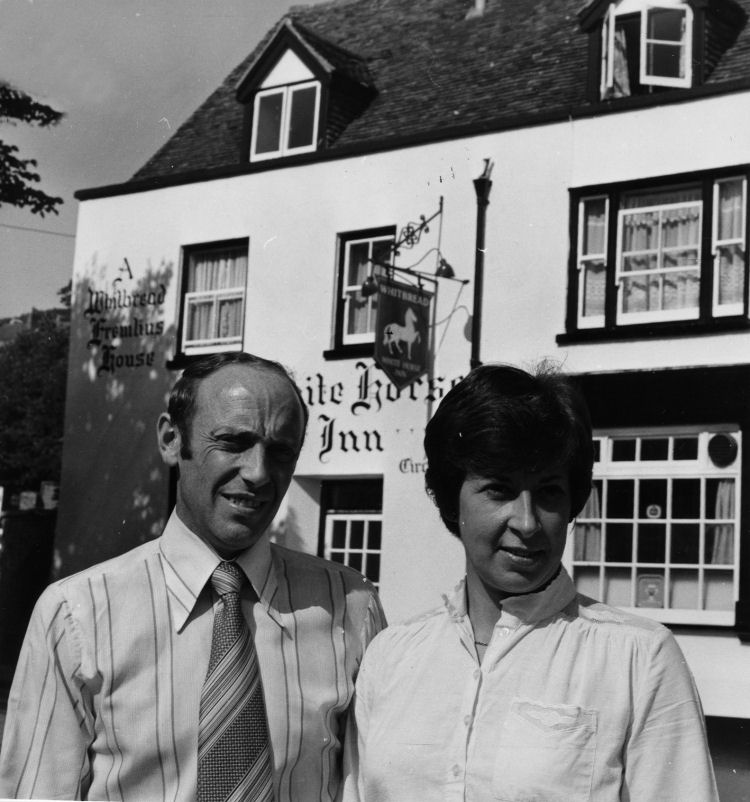
The landlord in 1978 was J A Aubrey, who I am informed are the people
in the photo above. |
In the 1800s the "White Horse" was said to have the coldest cellar in
Dover - even during the summer.
Apparently this is because in their cellar lives a ghost called George -
the spirit of a mariner who sadly drowned at sea and was buried under the
cellar.
Some locals have even claimed that George has pulled them a pint!
In 1895, coaches from St. Margaret's-at-Cliffe ran to the inn every day
except Sunday.
Much renovation has of necessity been made over the years but its old
world charm and antiquity is still very much in evidence.
A Fremlin house.
Now Freehouse (2007).
|
|
Unfortunately the pub closed at the start of September 2012, but is now again
open for business again (December 2012).
I am informed in 2016 that it is part of the Enterprise chain.
|
From the Dover Express, Thursday, 11
January, 2013. 65p.
REGULARS' DELIGHT AS HISTORIC PUB OPENS
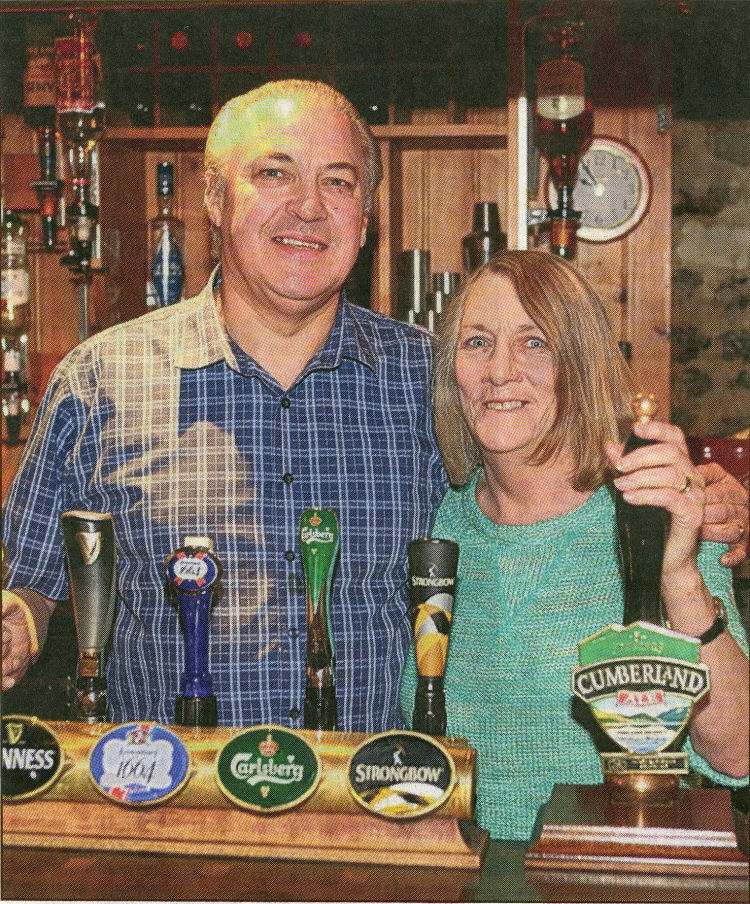
FRESH START: New owners of The White Horse, Tony and Janis Zammit
DOVER'S oldest pub has reopened, much to the delight of the locals.
The White Horse, in St James Street, invited punters back in for a
pint on Friday, December 21.
New owner Tony Zammit, who has taken over the pub with wife Janis,
told a 200-strong group on Facebook: “As you'll appreciate we've been
extremely busy preparing for the re-opening of your pub. However D Day's
finally here.”
The launch appeared to go down well with visitors.
One user said the pub looks “remarkably unchanged, though a bit less
crowded than on closing day.”
Former landlady, Jeanette Harper, was force to shut The "White Horse"
in September last year. The tavern, which has served as a hub for
cross-Channel swimmers visiting the town, was also the site where
broadcasting enthusiasts first got together to discuss what became Dover
Community Radio.
The pub is believed to be Dover's oldest, with the history of the
premises going back to the reign of Edward III in 1365. Over the years
members of Dover Rowing Club have been frequent customers.
|
|
From http://www.ghostpubs.com accessed 17 June 2015.
HAUNTED.
In 1778, the 25th Foot Regiment, the Edinburgh Regiment, was in
garrison at Dover and the name of this pub was "City
of Edinburgh" after that occasion. Although there is another legend
that the City of Edinburgh named the pub after a wrecked freighter of
that name, in the Dover Straits when they used the name-plate off the
ship. It was renamed the "White Horse" in 1791. People used it to hold
inquests during the early 1800s. After one such inquest on a sailor
washed ashore from a wrecked ship, there have been reports of a man in
uniform playing a tin whistle and haunting one of the bars. The original
building was constructed during the reign of Edward 3rd in 1365. It was
then occupied by the verger of the adjacent St James's Church. By 1574,
it was the home and offices of the Ale Taster for Dover. Inside are bare
wooden floors, a white painted ceiling and black beams. The bar counter
is built of brick.
|
|
From the Dover Express, 24 September 1015. By Joe Kasper.
Swimmers’ graffiti is welcomed at this pub.
Cross-Channel athletes leave their mark.
THE writing is on the wall for these pub landlords - literally.
As you enter the White Horse Inn it is very noticeable that there are
thousands of words daubed on the walls and ceiling.
According to Tony, 66, and Janis Zammit, 63, these are messages from
Channel swimmers.
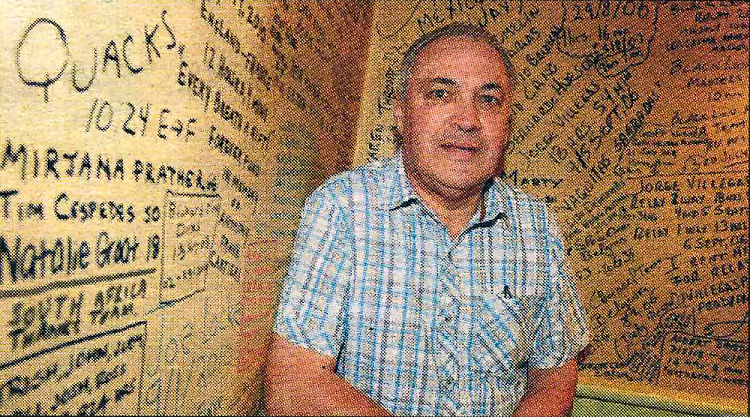
The married couple of 28 years moved in to reopen the boozer in 2012 and
found the writing. They decided they would continue the tradition and
welcome the athletes to leave the messages.
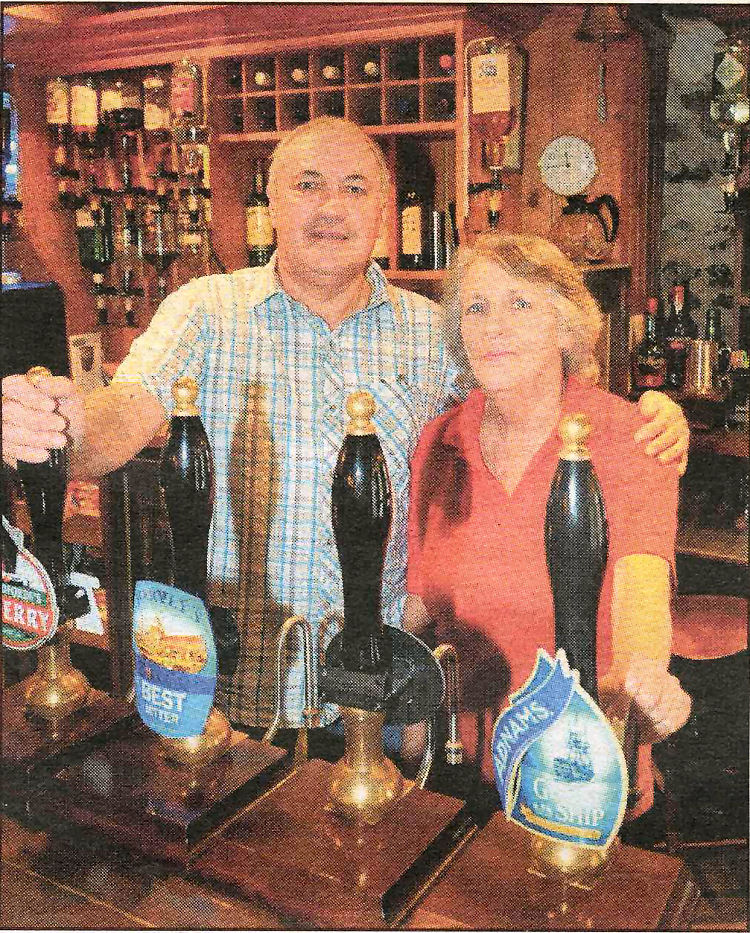
Tony said: “We’ve had a lot of Channel swimmers over the last three
years - about 200 every year.
“The other day ten came in. The latest one was an Australian lady who
did it three times in one swim.”
The pair have played host to all sorts of people coming from all over
the world, including America, Iceland and Mexico.
But the interesting stuff does not stop there for the Castle Hill Road
pub, as its fame has reached as far as Kenya after a film crew used the
White Horse as a stop off.
Filming.
Tony said: “Last year we had five or six crews here - TV and film. They
were filming a reality program and the aim was to take a Tusker beer
from Nairobi to London and this was one of its stop off points.
“Then there was another show we were on - Channel Patrol. We were on the
first episode of that on BBC2.”
For Janis, being around famous people is nothing new. She used to work
in the White Lion Hotel in Tenterden when royalty including the Queen
Mother and Princess Anne stayed.
When Tony was made redundant as a national account manager in 1996, the
couple paired up at the Vine Inn, also in Tenterden, minding the pub for
a friend.
A year later, they moved to the Huntsman and Horn near Herne Bay and in
2008 switched to The Frenchman in Folkestone.
On moving to the Dover pub, Tony said: “We saw the potential. It was
closed when we saw it and it was in a pretty sorry state.
“We’ve got enough experience to know what can be achieved.”
But with the St James scheme developing right in front of them, what
does the future hold?
Tony said: “I think it’s a good thing. Not only a good thing in this
particular area but for the whole of Dover.
“It’s going to raise the profile overall. We are actually in the
prime position.
“You never know what’s going on in the future but we will see how it
goes.”
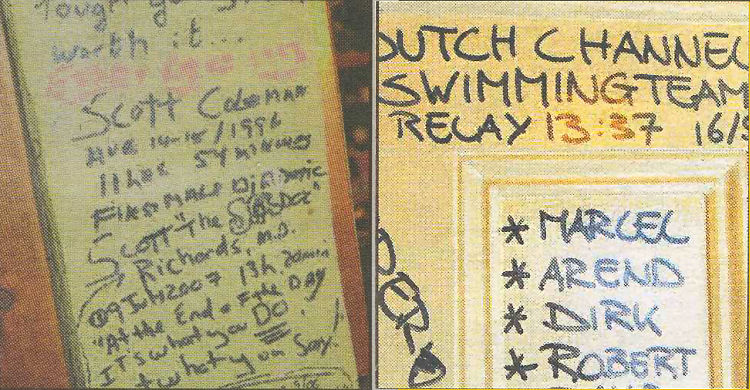
TIMINGS: The athletes have recorded their swim times and swimmers
have left their mark at the White Horse.
|
|
From an email sent 6 December, 2016.
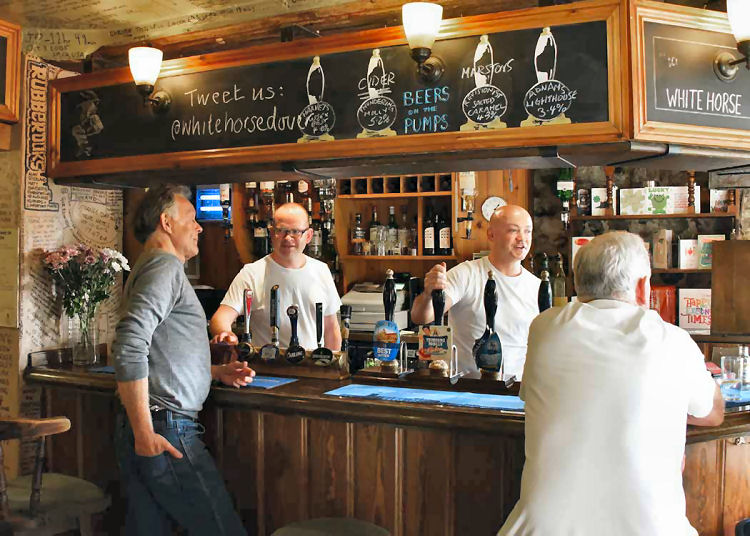
Above photo showing the licensee in 2016, Julian Cowley (left) and
Stuart Fox (right). |
|
From the Dover Express, 19 October 2017. By Lauren MacDougall.
Seaside pubs on the short list for county’s best boozer award.
THE finalists for the Kent Tourism Awards 2017 have been announced, with
three pubs making the shortlist for best boozer.
The awards, organised by Visit Kent, recognise 22 businesses in the
county across seven categories, including family friendly business of
the year, large visitor attraction of the year and the hidden gem award.
Sponsored by Shepherd Neame, the Raising the Bar Award honours the
county’s tourism pub of the year. This year the nominees comes from
across east Kent with pubs in Dover, Margate and Wingham.
The White "Horse Inn" in Dover is one of the town’s oldest residences,
dating from 1365.
It was built during the reign of Edward III as a dwelling for the
Churchwarden of St James Church, which stood next door.
Today the "White Horse" is a local pub dispensing various beverages
including delicious coffees, a superb collection of trendy gins and a
selection of well-loved pints.
It also records on its walls, ceiling and doors details of many
Channel Swimmers from all over the world, as well as hosting tourists
from afar afield as America.
|
|
From the Dover Express, 7 December 2017. By Sean Doherty.
Kent's oldest pub raises bar as it is named boozer of the year.
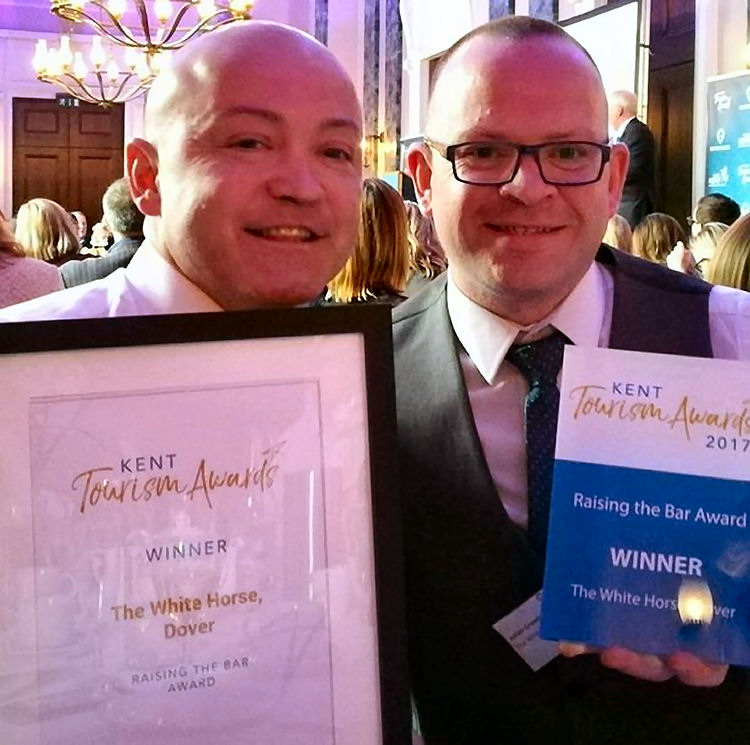
Managers Stuart Fox (left) and Julian Crowley with their award.
DOVER’S oldest pub has been named the Tourism Pub of the Year at the
Kent Tourism Awards.
The White Horse in St James Street, Dover, was presented with the
Raising the Bar Award at a ceremony on November 24.
Managers Julian Crowley and Stuart Fox were delighted at having their
achievements recognised. Julian said: “It’s fantastic. I still can’t
believe we have won.”
Julian and Stuart, who have been together for 12 years, took over the
venue in September 2016.
Since then, the couple have achieved incredible success in a short time
- despite neither having any previous experience managing a pub.
Julian said: “We both decided to throw caution to the wind and take over
a pub, and this was the only one we were interested in.”
Within a year, they managed to improve the pub’s TripAdvisor rating from
being the 25th highest-rated restaurant in Dover to the second, where it
currently sits, while briefly managing to snag the number one spot from
Indian restaurant Namaste.
Success.
Julian believes that his history in hospitality, having spent 12 years
working for P&O Ferries, and Stuart’s experience as a senior charge
nurse at Medway A&E have contributed to their success at The White
Horse.
He said: “I would say my training at P&O and Stuart’s training in the
hospital, his ability to speak with people, really helped us.
“And our enthusiasm. We haven’t taken over the pub just to sit behind
the bar. We both work.”
The pub has an illustrious history, having been built in 1365 to house
the churchwarden of St James’ Church in 1365 and has been used as a pub
since 1652, originally under the name "City of Edinburgh."
Since 2002, swimmers who managed to cross the Channel have written their
names, nationalities and details about their swim on the walls of the
pub.
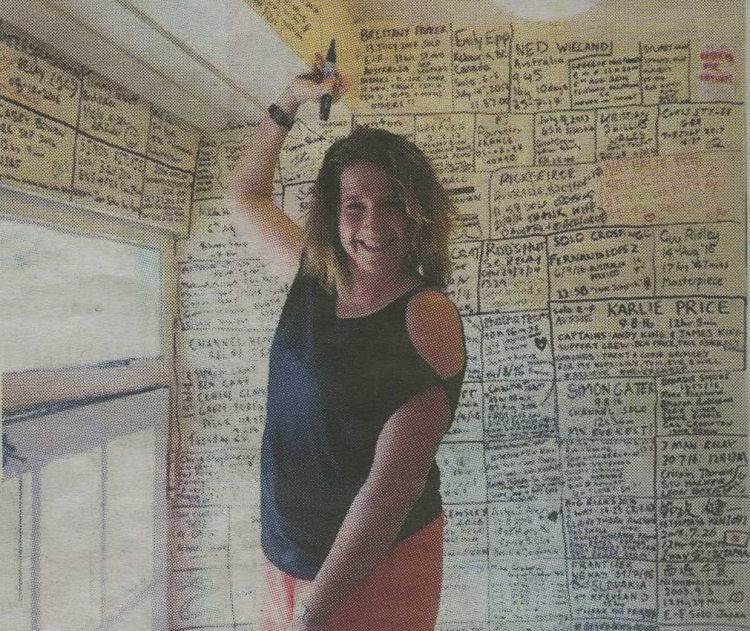
Channel swimmer Rachelle Silver finds space for her name.
Although the walls have since run out of space, the Channel Swimming &
Piloting Federation has provided a book for people at the pub to sign.
Julian said: “There are swimmers who have swam the Channel many years
ago who have offered to come to scrub their names off and sign them
smaller which is a very nice gesture.”
The pub offers a range of 40 gins and in May 2017 gained Cask Marque accreditation.
Stuart said that the food offered by the pub has also been instrumental
in bringing it up to its current high standard.
He said: “We have done so well on the food side. We offer traditional
English pub food, home-made, and try to source everything as locally as
possible.”
Stuart said that while the large number of guest houses has led to its
recognition as a valuable tourist spot, the pub also has retained and
attracted a large, loyal custom basis of residents.
He added they are open to trying new things with The White Horse and are currently hosting the
pub’s first free art exhibition, showcasing work from local art
conglomerate Art31, which will run until December 31.
At the awards, Julian and Stuart were told that their use of social
media in promoting the pub played a role in their winning.
As well as their Facebook page, the pub maintains a presence on
Instagram and Twitter.
Stuart said: “We take photos of the staff, of the customers, of swimmers
from different countries whose friends then see them. It helps make the
pub more international.”
|
|
From the
https://www.kentlive.news By Lauren MacDougall, 12 July 2018.
How a scathing negative review led The White Horse in Dover to win a
national award.
Getting the odd negative review here and there is part and parcel of
owning a pub or restaurant.
While scathing comments from customers on TripAdvisor, Google and other
tourism platforms are like water off a duck's back to some in the
hospitality business, to others they are seen as an opportunity to stand
out and make a name for themselves.
And that's exactly the attitude the owners of the "White Horse" pub in
Dover had when they received a critical review by a Google user.
In it, he called the St James Street pub "expensive", "more of a
restaurant" and said there were "posers sat the bar". But instead of
taking his comments to heart owners Julian Crowley and Stuart Fox hit
back in a creative way - and won an award for the way they did so.
The pair turned a negative into a positive, posting on social media
asking which of their customers wanted to own up to being the 'poseurs'.
They posted a picture of the review on Facebook, saying: "Lovely Google
review has appeared.
"To all our lovely customers; please feel free to step up to take credit
for being the 'poseurs'.
"Kitchen open tomorrow lunchtime 12 -2 and evening food service from 6 -
8pm. The other 7 hours we are open, we function only as a pub. Sorry."

The "White Horse" managers Stuart Fox (left) and Julian Crowley (right)
This generated so much positive attention and comments on The White
Horse’s social media pages, that a new hashtag was created: #PoseursAtTheBar.
A chalkboard artist wrote ‘Poseurs at the Bar’ above the bar, and now
tourists and locals alike pose, take selfies, and even bring props with
them to have their photographs taken under the sign.
For their efforts, Ei Group, the UK’s largest pub company, has voted
the publicity drive the ‘Best Marketing Initiative’ at its inaugural
Awards for Excellence.
The awards also recognised an older initiative by the pub.
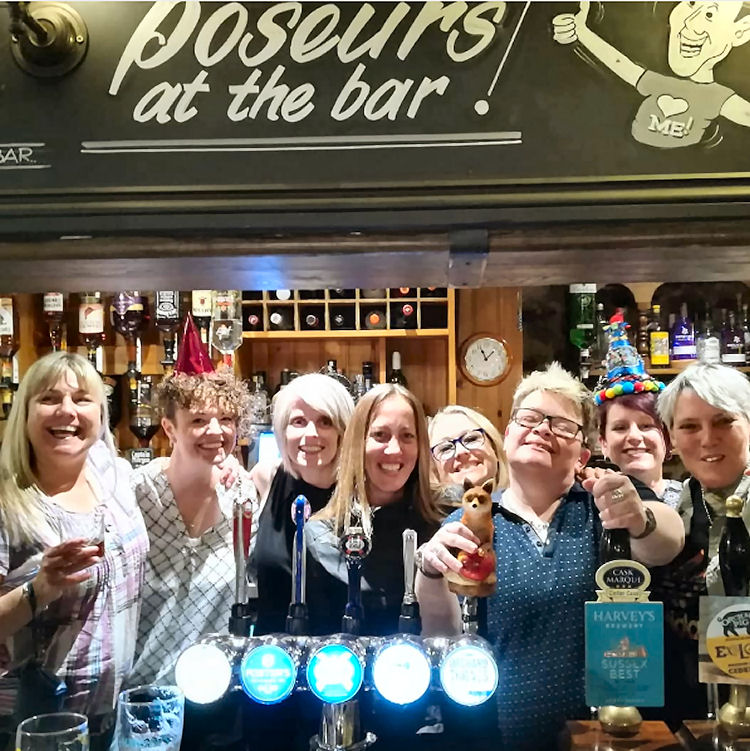
|
|
From the
https://www.kentlive.news By Lauren MacDougall, 21 December 2019.
The 33 pubs in Kent you have to drink at in 2020 according to CAMRA.
In total Kent has heaps of pubs listed in the guide and, while 33 of
these are new entries, others have appeared in previous editions of the
guide.
A total of 33 pubs from around Kent make up the new entries that feature
in the 2020 edition of the Good Beer Guide.
The guide is produced annually by the Campaign for Real Ale (CAMRA), the
independent guide to the best boozers in the UK that is researched by
unpaid and independent volunteers nationwide.
Tom Stainer, CAMRA’s chief executive, said: “For nearly five decades,
the Good Beer Guide has been a comprehensive guide to the UK’s
breweries, their ales, and the best outlets to find them in across the
country.
“What makes the Guide unique is that all the entries are compiled and
vetted by a huge volunteer team, based around the country. We work hard
to ensure that all areas of the country are covered and, unlike with
some competitor titles, inclusion in this book is dependent only on
merit, not on payment.
“The Good Beer Guide has always had an important role in acting as a
barometer of the beer and pub industry. We believe information gleaned
from the Guide is absolutely vital in the drive to save our pubs from
closure and campaign for policies that better support pubs, local
brewers and their customers.”
This pub is included in the 2020 list.
White Horse, Dover.
The pub is one of Dover's oldest residence, having first been the
home of St James' churchwarden in 1365
What the guide says: "This Grade II-listed building can trace its
history saloon bar. Quiz night is the third Thursday of each month."
|
|
From the
https://www.kentlive.news By John James, 21 September 2019. We
visited 5 of Kent's best pubs according to CAMRA in one evening: Here's
what we thought:-
We headed for Dover and visited five accredited real ale good time
pubs in and around the town centre.
The beer lover’s manual of all the haunts in the country, the 2020
CAMRA guide, has been published.
It’s no surprise that Kent features heavily among the selections,
with entries from across the county.
In the interests of journalism, we thought we’d try out a few.
But rather than re-visiting the usual suspects (your Canterburys,
your Sevenoaks, your Tonbridges), we thought we’d go somewhere you might
not normally associate with real ale.
Join me on this journey as I literally drink on the job.
The White Horse, St James St.
Next stop on my quest was The White Horse, a quaint little bolt hole
opposite the St James retail park.
Incidentally, you can find out what I thought of their food offerings
here.
Anyway, this pub is what I would call a proper local.
It's small but cosy inside with a good selection of ales and lagers, the
cheapest being £3.85 for a Cornish Tribute ale.
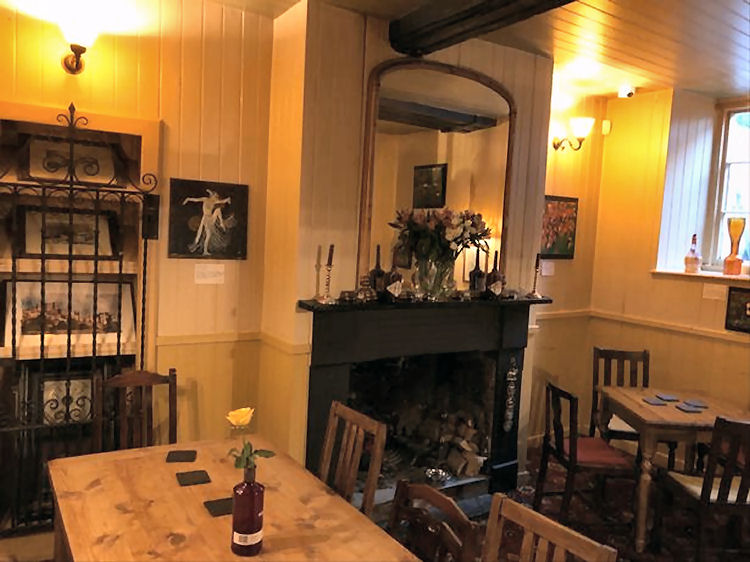
The cosy interior of the White Horse.
The food here is famous around these parts, but before I can mention I'm
from KentLive and that maybe I'm entitled to a taster I'm told
otherwise.
"We don't serve food on Wednesdays," says Alice Bridges, who recently
started working here behind the bar." On Wednesdays we get the locals
in."
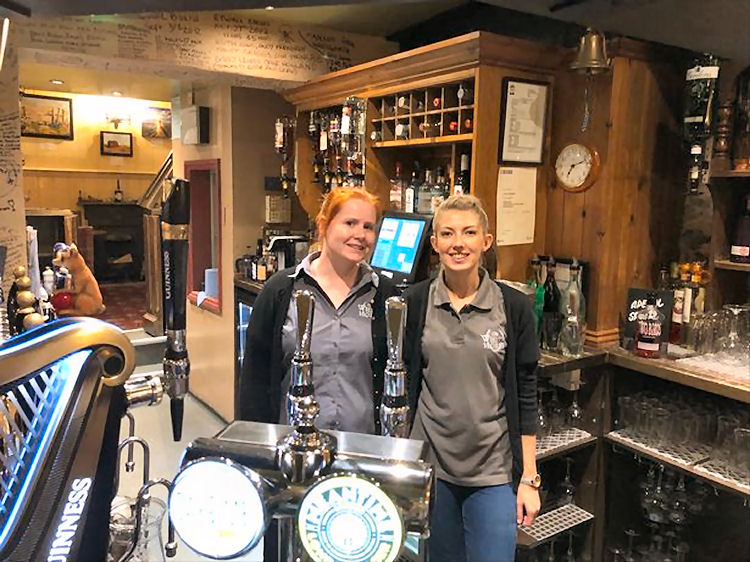
The friendly bar staff at The White Horse.
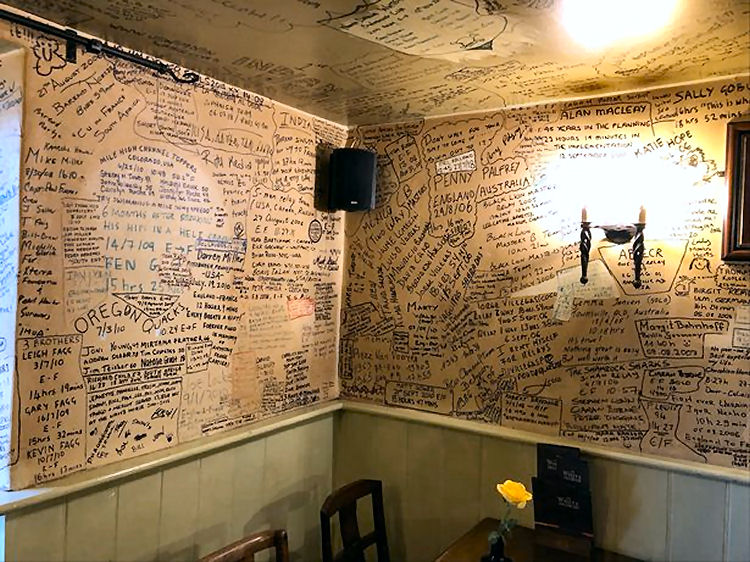
The walls of The White Horse are covered in writing.
Rather than read it myself and make an educated guess, I asked Alice.
"They're the names of those who've swum the Channel. We've actually run
out of space, but we made an exception this week for Sarah Thomas, she
swam it four times without stopping."
I went for further exploration and stumbled across a beautiful hidden
terrace that looked out onto a ruin of some sort. There I met an
American named Hunter.
We bonded over our mutual admiration for Logan Paul and the weird, but
very true fact that the ruin we were staring at was older than his
country.
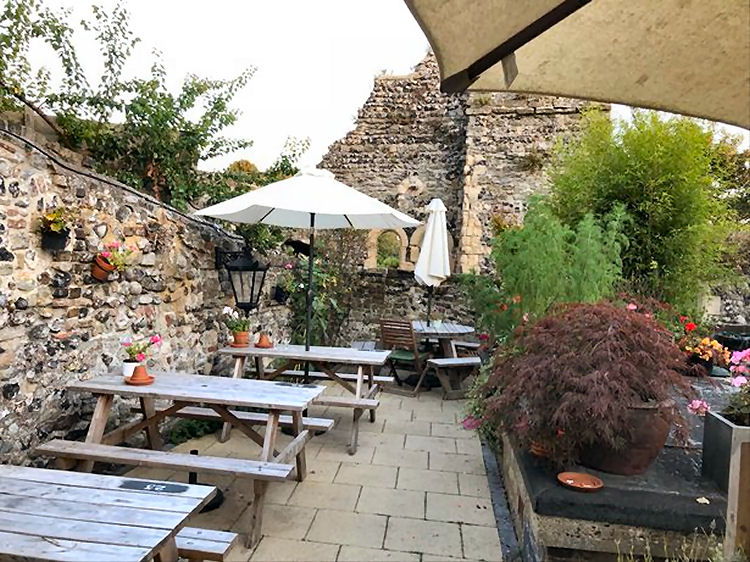
The Hidden Terrace.
Before I left I asked Hunter what he thought of The White Horse.
"England does the best pubs in the world bro!"
Five stars then from Hunter.
To previous pub on tour.
To next pub on tour.
|
|
From the
https://www.kentlive.news By Lauren MacDougall, 6 November 2019.
Kent’s cosiest pubs with gorgeous log fires that will shield you from the cold.
These stunning pubs come with crackling fires, beautiful interiors and tasty food.
Is there anything better than curling up next a toasty log fire, pint in hand?
With the winter months drawing in and November predicted to be one of
the coldest ever, knowing your local cosy pub with a gorgeous log fire
is more important than ever.
Whether you're looking for a tipple after a brisk walk or just after
a warm afternoon out, there's plenty of choice.
These stunning pubs come with crackling fires, beautiful interiors
and tasty food.
Some of them even have more than one wood burner, so you won't be
fighting for the coveted space in front of the flickering flames.
If you're looking for some inspiration, check out our list below.
The White Horse.
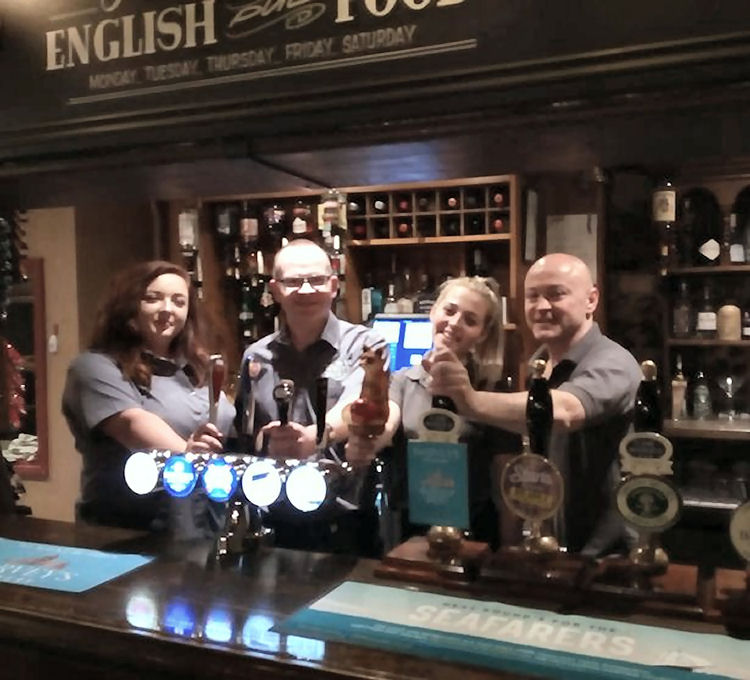
Julian and Stuart, seen here with staff members Charlotte (left) and
Beth (middle), have achieved great success since they started running
the pub in September 2016.
Where : St James St, Dover CT16 1QF.
What : Located in St James Street, Dover, this particular pub has the
names of countless swimmers who have attempted to tackle the Channel.
The cosy atmosphere is perfect for a celebratory pint and Sunday roast
after tiring swim.
One TripAdvisor reviewer said: "Having enjoyed the Summer menu at the
White Horse, the much longed for Sunday Roast's were back! and, they
were as good and delicious as always...
"We only planned to have lunch, however the company of the hosts and
their staff along with the great atmosphere prolonged our visit!"
|
|
From the
https://www.kentonline.co.uk By Max Chesson, 31 May 2023.
The White Horse Inn, Dover, hits back after one-star Google review over
‘salty’ and ‘soggy’ food.
A popular pub has hit back at a scathing review after CCTV revealed
diners had gobbled up their Sunday lunches – despite claiming the food
was “inedible”.
Bosses at The White Horse Inn in St James’ Street, Dover, were horrified
see its roast dinner branded “soggy” and “salty” as well as criticism of
the attitude of staff.
But joint-landlord Stuart Fox witnessed the group tucking happily into
their meal via the eatery’s CCTV cameras before launching into a tirade
over the quality of the food.
Speaking to KentOnline, Mr Fox hit out at the attitude of the offending
party - who he accused of trying get freebies rather than pay for the
food.
“I was called down at around three o’clock on Sunday afternoon for a
very unhappy table. I came down but decided to check the CCTV just
before I do to see what the issue might be,” he said.
“I was told by staff the group claimed the food was inedible - the
review calls it salty and soggy - and they started picking off bits to
take home to the dog.
“I can see based on the CCTV what they’re saying makes no sense.
“They looked like they enjoyed it, one of the group even leaned over the
table to try a bit from someone else’s plate and three of the four
plates are completely clear.”
The complaining quartet ordered three roast beef dinners and a pork
lunch, with all the beef meals being fully eaten - though Mr Fox admits
the pork dinner was barely touched.
But a Google review was later published sarcastically wishing any future
customers good luck.
“After hearing positive reviews about this place, I was very much
looking forward to eating here however, I’ve left feeling very angry and
disappointed,” it says.
“I’m not sure what I’m more disappointed in, the salty soggy roast
dinner or the attitude of the staff. Either way good luck if you visit
this establishment.”
With the incident fresh in the mind of Mr Fox, he spoke out against the
family following their harsh words, noting he had tried to compromise
but to no avail.
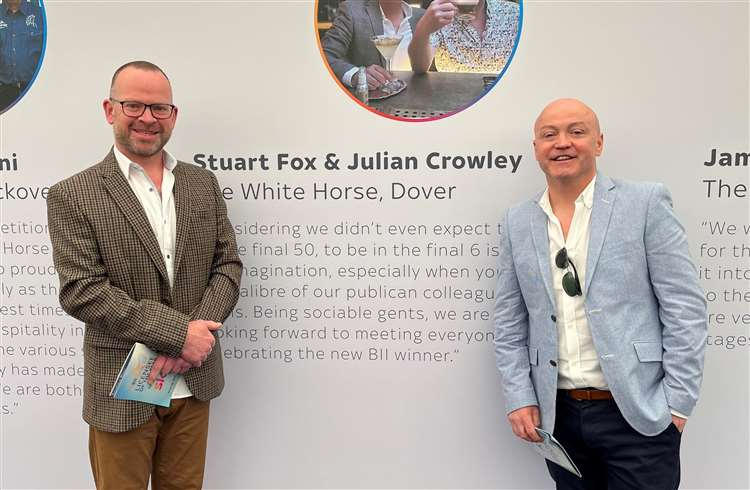
Julian Crowley and Stuart Fox, landlords of the pub. Picture: Stuart Fox.
He said: “I approached the table and the mother starts saying about how
she’s even more annoyed now she’s had to wait to be seen. I mentioned
the CCTV and the men started getting very aggressive.
“I’ll always defend my corner but you’ve got to meet people halfway so I
went down and said I would offer a refund for the pork dinner that had
gone mostly uneaten.
“They’re saying the food is inedible but three of them cleared the
plates. They then change their story about what exactly they said before
begrudgingly paying - no tip of course.”
And he has ridiculed claims by the group that the food was unfit for
consumption - by posting on social media pictures of the three empty
plates.
“I can hold my hands up when we make a mistake but when it’s somebody
trying to create a problem for no clear reason you become bent over a
barrel - you can’t remedy it,” he shared.
“If it’s that salty or inedible you wouldn’t eat it until the plates
clear. They’ve been surrounded by staff – they could have spoken up
while eating at any time but they finished the lot.
“At a time when hospitality is going through a rough time, feedback like
this can be so damaging and it can affect staff morale - all the time
the team work so hard.
“You try to always have a positive outlook and an upbeat way of looking
at things. It’s important to put a positive spin on things to uplift
ourselves and the team.”
Stuart and his partner Julian Crowley took over the pub in September
2016 as landlords and have received praise for their approach to
innkeeping.
Having been a runner-up in the 2022 British Institute of Innkeeping
Licensee of the Year category, the pair have become firm favourites for
Dover residents.
Amassing a 4.5 star rating on TripAdvisor, The White Horse holds the
accolade as the second best restaurant in Dover - trumped only by the "Elephant & Hind."
A Grade II-listed building, it was originally the home of the Verger to
St James’ Church before becoming a pub in 1818.
(It's history goes back a lot longer than that.
Paul Skelton.)
Historic records show that the cellar was used as a mortuary and
inquests on bodies recovered from the sea were said to have been heard
in the rear dining rooms.
The pub survived unscathed during both world wars, although the
neighbouring St James’ Church was wrecked. |
LICENSEE LIST
JEMETT (widow) 1713+
ELDRIDGE Honor 1755-63 ?
GALLANT Robert ????
Pub name was "City of Edinburgh"
before this landlord.
PARRY Thomas 1791-93
PAIN Thomas 1791-92

BULLARD Thomas 1805-18/Mar/24 dec'd

HORN James 1826-40+
   
BUTLER John Edward 1847-52+ (age 30 in 1851 ) )
 
BULL John 1851+ (carpenter age 39 in 1851 ) )
SPICER William 1858
SPICER John Jan/1860

FRIEND John Jan/1860-66
 (age 48 in 1861
(age 48 in 1861 ) )

HARRIS Alfred Mar/1870-May/80 (age 49 in 1871 ) )
 
CLEMENTS Thomas May/1880+
 ("Hawkhurst
Hotel" tap-keeper) ("Hawkhurst
Hotel" tap-keeper)
WESTLEY William 1881 (age 47 in 1881 ) )
WESTLEY Richard 1881-82+

 SPAIN Harry Beaufoy June/1890-1901 (age 28 in 1891
SPAIN Harry Beaufoy June/1890-1901 (age 28 in 1891 ) )
      
SPAIN Mrs Selina 1901-Sept/29 (age 47 in 1911 ) )
   
BANKS Harold Sept/1929-32+
 (Former Club secretary, Tonbridge)
(Former Club secretary, Tonbridge)
IMRIE William Alexander Richie 1936-37 end

FAIERS Alfred John George 1937-45 end

ATKINSON Cyril F 1945-50 dec'd

 1953 1953
ATKINSON Mrs F E 1950-66 end

BAILEY Herbert John 1966-78 end
 Whitbread Fremlins
Whitbread Fremlins
AUBREY J A 1978
WILLETT Charles S T 1980-91 retired
CONNELLY Trevor 1991
 AMOS Nigel 1993
AMOS Nigel 1993
BARBER Andrea 2000
HARRISON Peter and COULSON James August 2001-02+
BEATON Jack & Jill AYRES to Jan/2010
HARPER Jeanette Jan/2010-Sept/2012
ZAMMIT Tony Dec/2012-Sept/16
CROWLEY Julian & FOX Stuart 12/Sept/2016+
 Dover
and Deal Directory and Guide 1792 Dover
and Deal Directory and Guide 1792
 From the Pigot's Directory 1823 From the Pigot's Directory 1823
 From the Pigot's Directory 1832-33-34 From the Pigot's Directory 1832-33-34
 From the Pigot's Directory 1839 From the Pigot's Directory 1839
 From the Pigot's Directory 1840 From the Pigot's Directory 1840
 From Bagshaw Directory 1847 From Bagshaw Directory 1847
 From the Post Office Directory 1874 From the Post Office Directory 1874
 From the Post Office Directory 1882 From the Post Office Directory 1882
 From the Post Office Directory 1891 From the Post Office Directory 1891
 From Pikes Dover Blue Book 1895 From Pikes Dover Blue Book 1895
 From the Kelly's Directory 1899 From the Kelly's Directory 1899
 From the Post Office Directory 1901 From the Post Office Directory 1901
 From the Post Office Directory 1903 From the Post Office Directory 1903
 From the Kelly's Directory 1903 From the Kelly's Directory 1903
 From the Post Office Directory 1913 From the Post Office Directory 1913
 From the Post Office Directory 1922 From the Post Office Directory 1922
 From Pikes Dover Blue Book 1924 From Pikes Dover Blue Book 1924
 From Pikes Dover Blue Book 1932-33 From Pikes Dover Blue Book 1932-33
 From Pikes Dover Blue Book 1938-39 From Pikes Dover Blue Book 1938-39
 From the Kelly's Directory 1950 From the Kelly's Directory 1950
 From the Kelly's Directory 1953 From the Kelly's Directory 1953
 From the Kelly's Directory 1956 From the Kelly's Directory 1956
 Library archives 1974 Library archives 1974
 From the Dover Express From the Dover Express
 From the Dover Telegraph From the Dover Telegraph
 Census Census
|
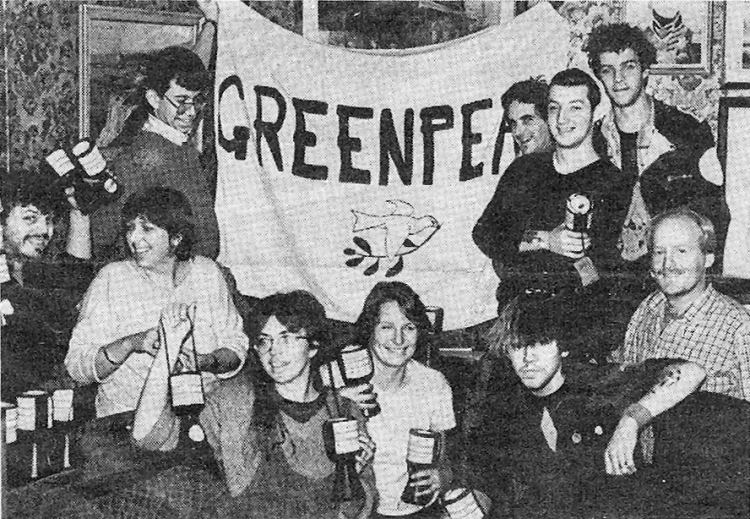
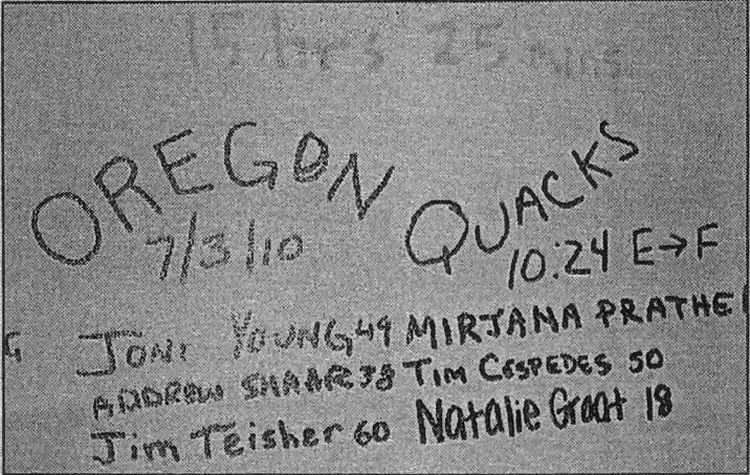
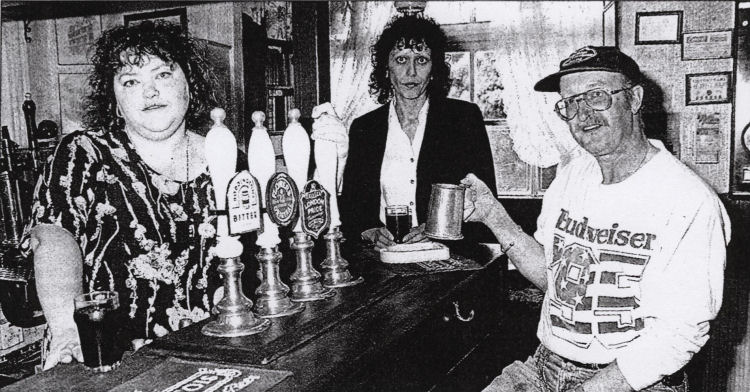
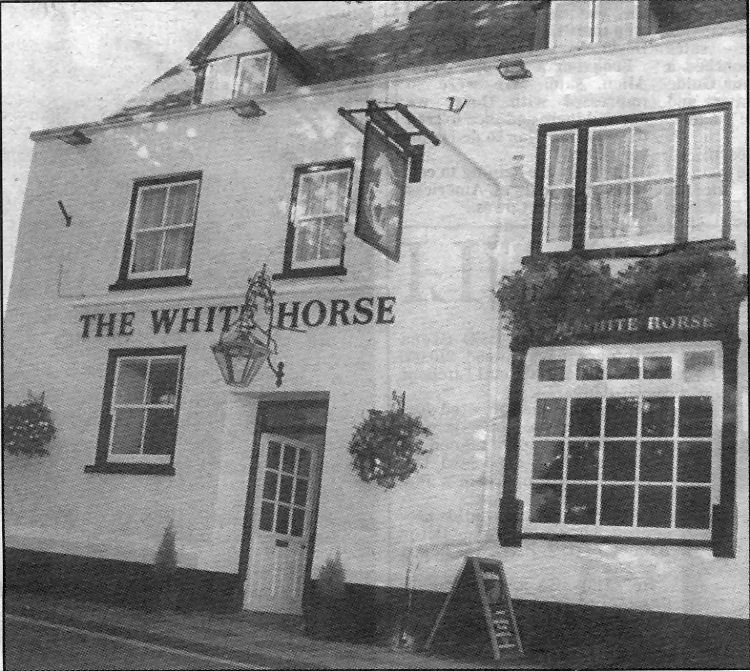
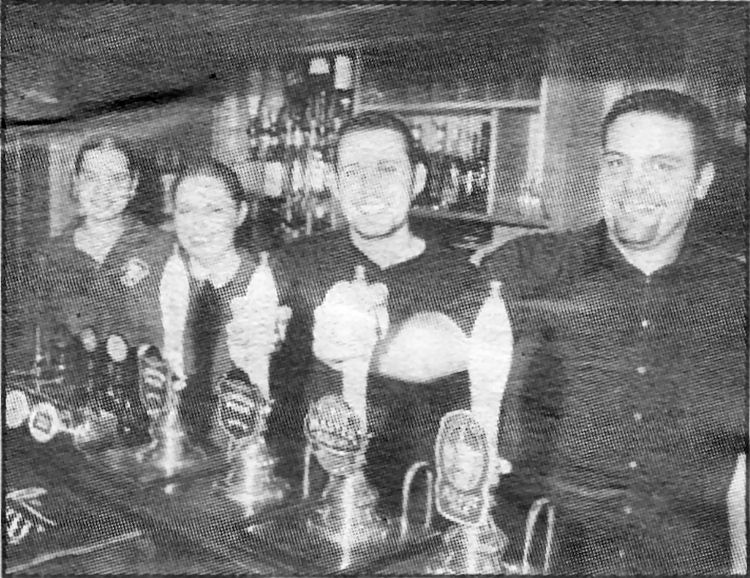
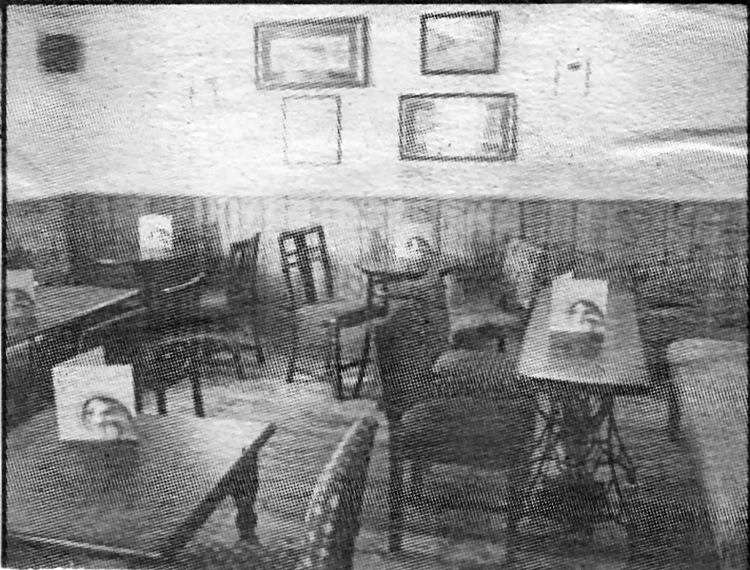
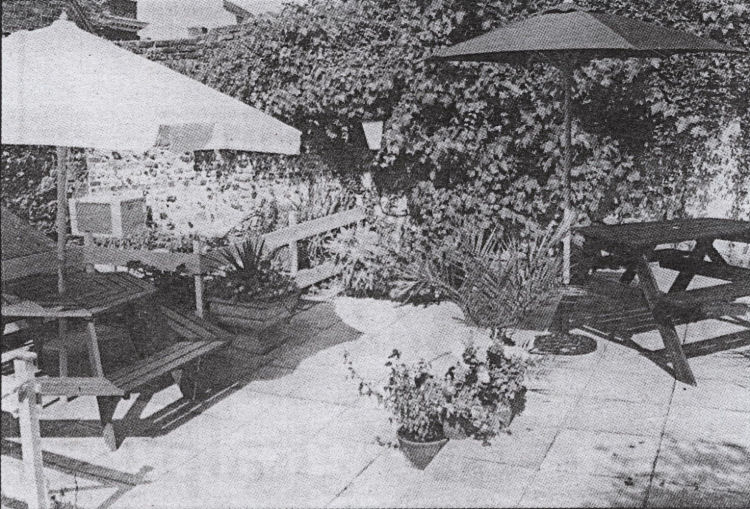
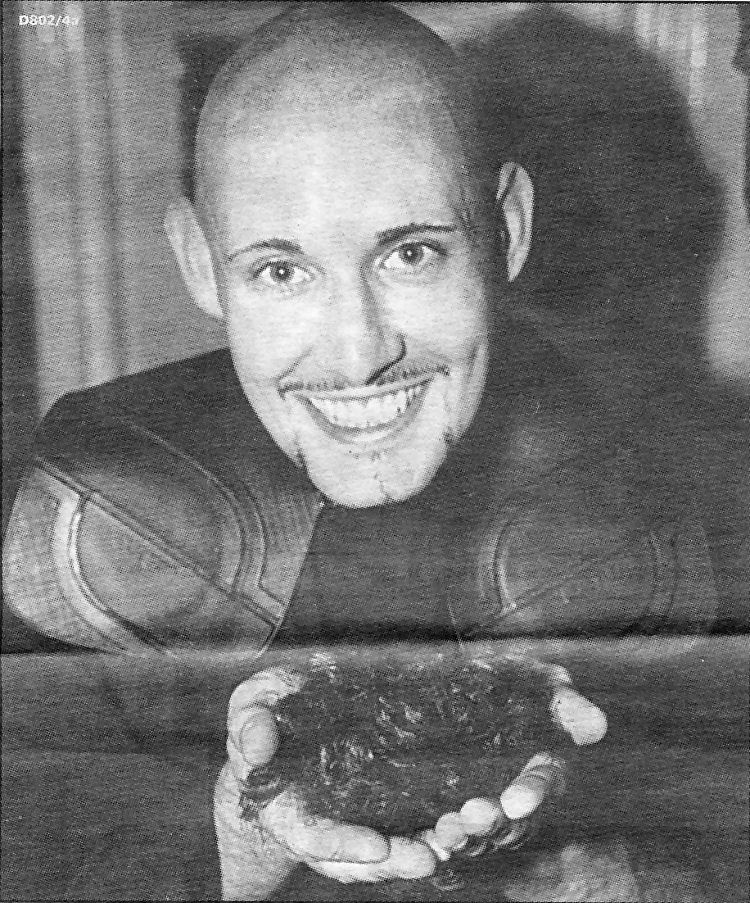
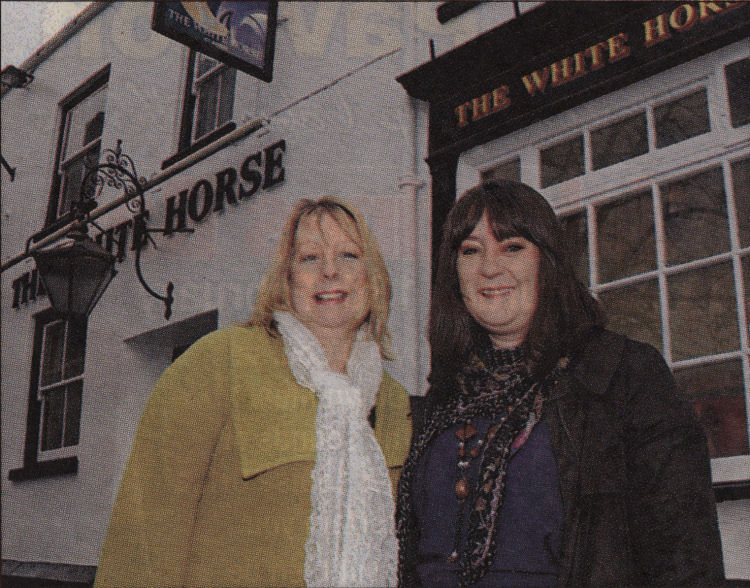
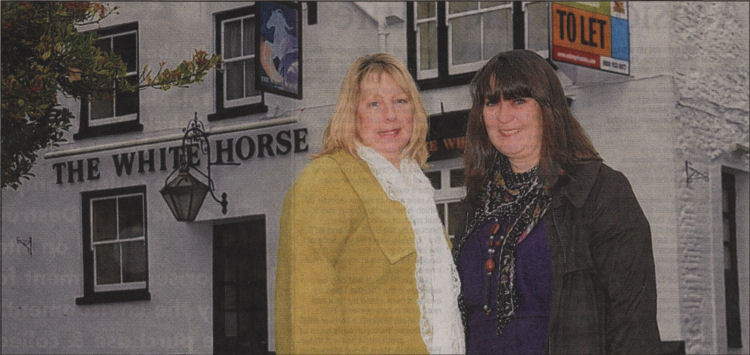


















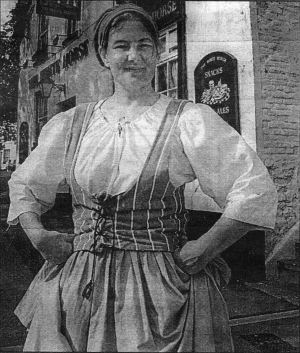 WHEN a history re-enactment group failed to turn up for a show at a Dover pub,
one of the members hastily improvised.
WHEN a history re-enactment group failed to turn up for a show at a Dover pub,
one of the members hastily improvised.













